#ObscureDavidTennantPerformances
Text
David as Benedick in Much Ado About Nothing (the first time he did it, that is!)
David Tennant fans are aware of 2011's brilliant Much Ado About Nothing, in which DT starred as Benedick, alongside Catherine Tate as Beatrice. Filmed at the Wyndham's Theatre in London and directed by Josie Rourke, the production was recorded and offered on Digital Theatre.
But did you know David had played Benedick before?
Yep - he sure has!
It was in 2001, a full decade before his production with Catherine.
Beginning in 1999, BBC Radio 3 launched Shakespeare For The Millennium, an ambitious project to dramatize seventeen Shakespeare productions in four years.
The project was done in collaboration with BBC Worldwide, which emphasized it wanted to take a contemporary, innovative approach to the Bard. It launched on 12 September 1999 with a Shakespeare discussion panel, and a new production of Hamlet -- starring none other than Michael Sheen as the Dane!
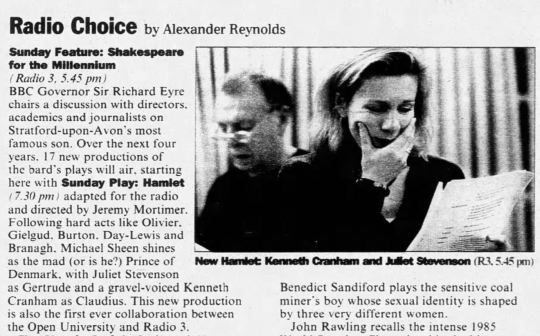
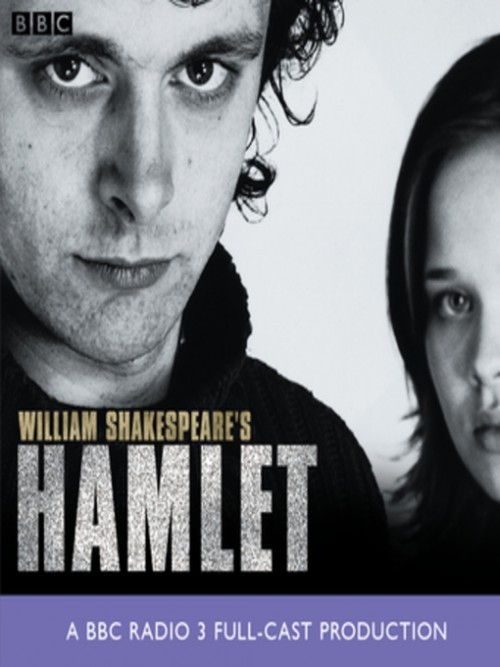
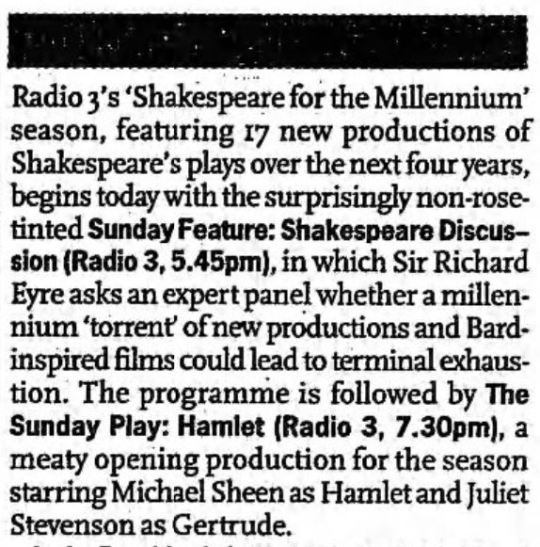
On 23 September 2001, BBC Radio 3 broadcast a new production of Much Ado About Nothing as the Sunday Play, with David in the lead role as Benedick and Samantha Spiro as Beatrice. Adapted by Sally Avens, it featured an introduction (as had all the previous productions in the Shakespeare For The Millennium series) by Richard Eyre, the former Director of the Royal National Theatre.
The production also starred a few other recognizable names. There was Chiwetel Ejiofor as Claudio, Emilia Fox as Hero, David Swift as Leonato, Julian Rhind-Tutt as Don John, and David Haig as Dogberry.
All original music was composed and performed by Simon Oakes and Adam Wolters.
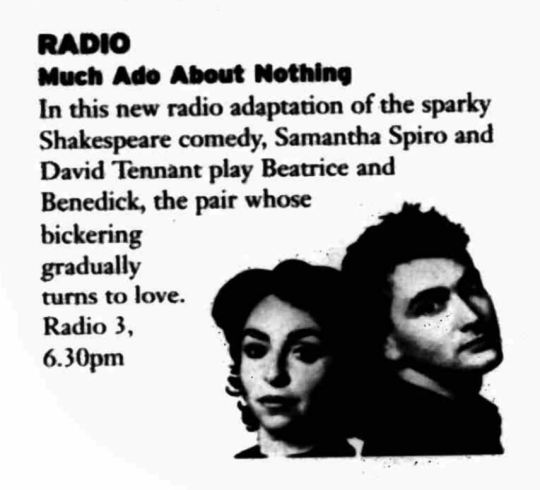
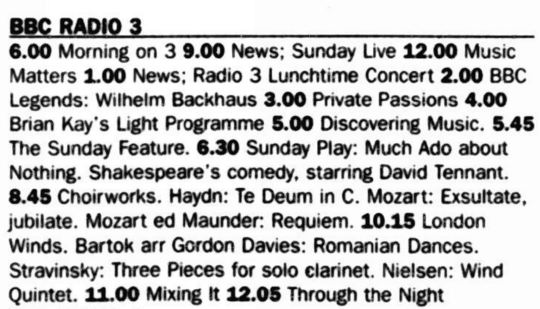
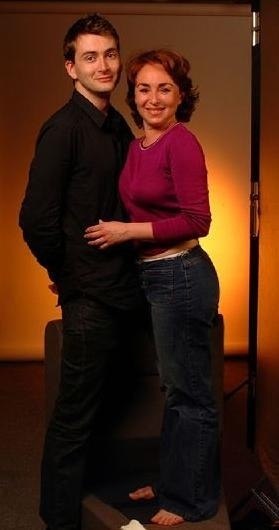
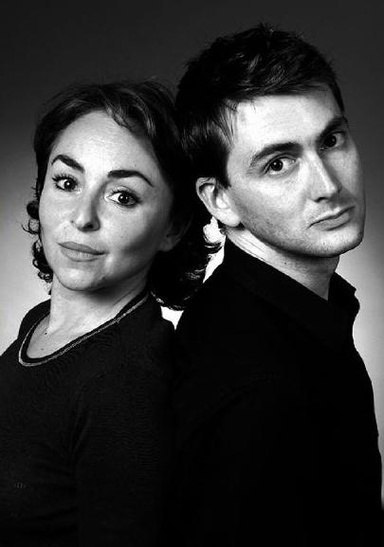
Radio listings and announcements, and promo photos of David and Samantha Spiro
Here's a review of the prodcuction!
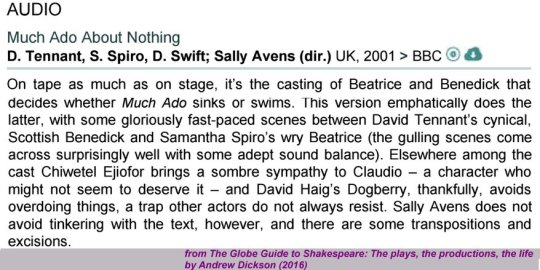
Much Ado About Nothing was commercially released by BBC Worldwide as part of the BBC Radio collection series in 2001.
The sleeve notes of cassettes and CDs of the production include a scene-by-scene synopsis, a full character analysis, and an essay on interpretation from the director Sally Avens.
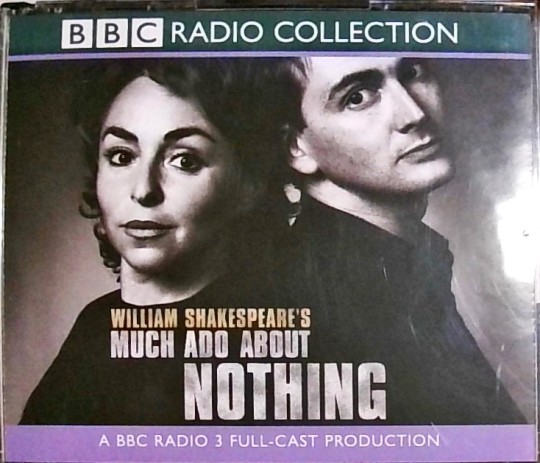
Almost four years later, in November 2005, BBC One broadcast a television series called ShakespeaRe-Told, a set of four adaptations of Shakespeare's plays. Each play was adapted by a different writer, and all were relocated to the present day.
The first to be broadcast - on 7 November 2005 - was a modern-day version of Much Ado About Nothing starring Sarah Parrish and Damien Lewis...and Billie Piper and Nina Sosanya and Olivia Colman!
You can watch it here:
youtube
Six days after this television broadcast - on 13 November 2005 at 7:15 pm - BBC Radio 3 re-broadcast the audio version starring David and Samantha in its 'Drama On 3' slot.
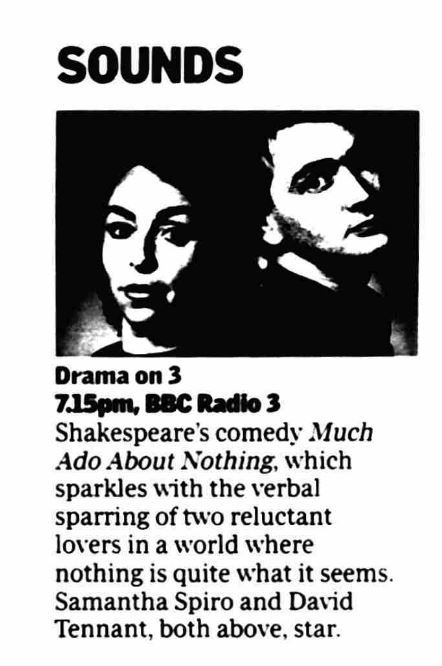
Fast forward to August 2020.
The BBC released a set of four BBC Radio Shakespeare collections: Histories, Comedies, Tragedies, and Roman Plays. Much Ado About Nothing was included in the collection of Comedies, and became available as an Audible digital download.
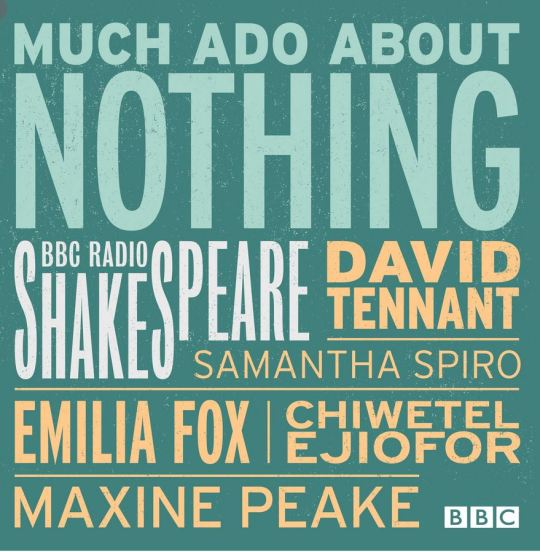
If you want to listen, you can find this collection a lot of places. It might be at your local library or on Overdrive, on Google Play, or as an Amazon Audible book.
Or, ya know, just go here:
88 notes
·
View notes
Text
David Tennant in Golaschin! - A Guiser's Play For Hogmanay (1989)
Okay Oh My God I did it! I promised to feature an upcoming obscure David Tennant work, and here it is!
I've bitten the bullet and recorded (probably badly!) a minisode about an up-until-now unknown part of David Tennant's body of work as a young Scottish drama student. This information didn't really fit into my theatre-centric podcast, but I didn't want to see it get lost in obscurity because it wasn't a theatre production.
Besides, it might've been his first foray as an actor on radio!
Enjoy! (Click below to listen - critics welcome!)
99 notes
·
View notes
Text
DT talk throwback: my interview w/Steve Pang, writer/director/producer of SPACES
This post is the second in the series of posts I'm making to rescue my lost interviews with people who worked with David in his earlier years: you can find the first, with David Blair - the director of Takin' Over The Asylum - right here.
Over half a decade ago now I was a writer for David Tennant News/DT Forum, one of the bigger unofficial fan sites of DT's at the time (now sadly defunct). During my time there, I got the chance in July 2015 to interview Steve Pang - the writer/director/producer of SPACES, a short film David starred in back in 1993. I didn't want this interview to sink into the depths of the Wayback Machine and I thought y'all might enjoy reading it, so here is that interview in its entirety (and if you'd like to see it in its original form, click here.)


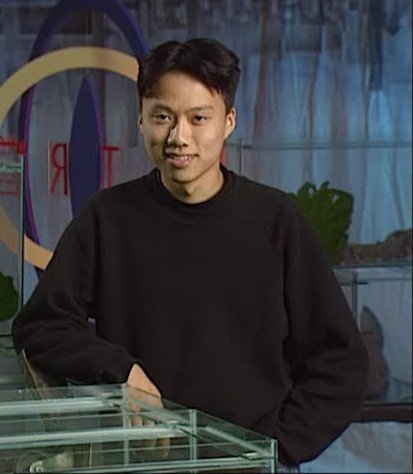
Screenshot of SPACES from Moving Image Archive / Steve Pang, Writer-Director-Producer (today, and in a 1993 interview)
--
Recently I was able to chat with Steve Pang, the writer, director and editor of SPACES. SPACES is a 1993 short film starring David Tennant as Vinny, a young man working a night shift in a car park in Edinburgh. The film depicts the characters Vinny meets over the course of the night: an older colleague with a troubled past, a bright young girl who uses the empty car park for her violin practice, and a young homeless boy.
Pang won a First Reels funding Award in 1993 from the Scottish Film Council and Scottish Television for the script he submitted for SPACES. First Reels was “a joint short film initiative from Scottish Screen (and its predecessor body the Scottish Film Council) and Scottish Television that was launched during 1991 by the Scottish Film Council in response to a perceived need for small grants to help young and first time film-makers to make or complete their first film or video project.”
Winning the award gave Pang the funds to make SPACES a reality. In the following years he decided to shift gears and move into film and television editing. He began in film as an assistant editor in the 1997 James Bond film Tomorrow Never Dies and on television in The Vicar of Dibley. Since then he has worked in various editing capacities on a lengthy list of projects including Wonka, Band of Brothers, The Da Vinci Code, Lord of the Rings: The Return of the King, The Hitchhiker’s Guide to the Galaxy, The 10th Kingdom, and Gravity.
How did you hear about the First Reels project?
The scheme was announced whilst I was at Napier University in Edinburgh studying for my degree. As it was open to students, pretty much everyone on the course applied as it was a rare opportunity to get funding to make films.
It’s my understanding the First Reels project gave filmmakers grants to help them realize their projects, but that the projects didn’t have to be finished films to be submitted. What stage in its development was SPACES at when you submitted it? Did the grant you won help you film and complete the work or had it already been completed in a rough form?
As I recall I submitted a script and a supporting application form. Had we not won the grant, I think the film would have still gone ahead in some form but we would not have been able pay the cast or equipment suppliers – which would have undoubtedly had a detrimental effect on the film, in my opinion.
Was SPACES your first film? Take us through its development from idea to reality. How did you decide on it as your submission for First Reels?
It was probably my second or third short, but certainly the most ambitious (everything else before that was really more just fooling around and experimenting with a camera). The goal was to ‘keep things simple’ and come up with an idea that could be shot in one location with a small cast. I had worked part time in a 24hr car park in the past and my experiences in that job were the source material for the film.
SPACES is set in a car park and tells the story of one young man’s night shift. What were your inspirations for the story line? he ending? Can you share a bit more about what you hoped people would take away from the film?
The short is essentially a dramatisation of a number of real life experiences I had working part time in a 24hr car park in Edinburgh. It sounds like a pretty mundane job, but I worked with some very interesting people and there were one or two unusual incidents. I thought collating everything into a single night would make an interesting short film. I’ve always found night time in cities really fascinating and I thought SPACES would be an original way of depicting that kind of atmosphere and mood.
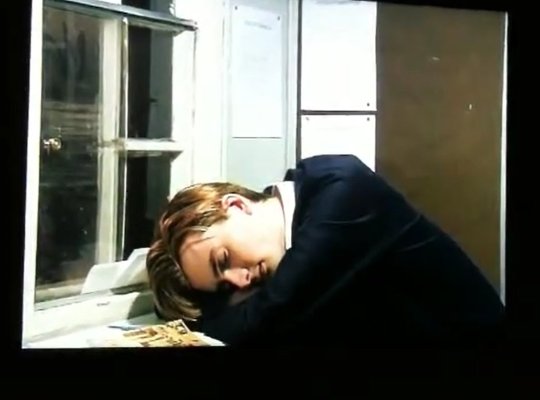
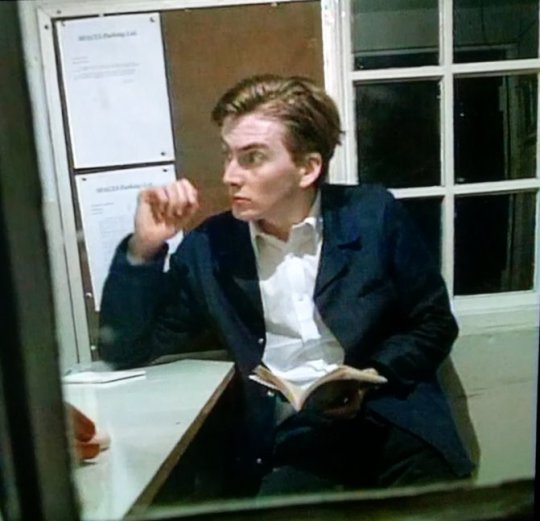

Screenshots from SPACES
Were the actors you chose initially the ones that actually appear in the film? How involved were you in choosing the talent, and how did the actors you chose come to your attention?
We contacted a number of local actors agencies and as I recall the actors in the film were all our first choices for each role. At the time I had no idea who David was or that he was about to become a big star. Looking back, I think he was already making a name for himself as an up-and-coming actor within the industry but as a lowly, newbie film student I didn’t have that ‘inside knowledge’. All I knew was that he seemed remarkably in tune with the character I’d written and came across as incredibly natural in the first audition. The role was his immediately. It was only after the film was completed and submitted that I started hearing comments along the lines of ‘wow you had David Tennant in your short.’
Speaking of actors — David was very young when you worked with him (it’s listed as only his 4th credited role). Was there something that impressed you about this young unknown actor? What about the experience of working with him still stands out for you all these years later?
Working with him – from rehearsal to shoot – was great. We had a tiny budget, a cold, dark location, and it was a night shoot. In hindsight, given that we were a bunch of newbie students and he was about to break through as a major actor, I’m grateful that he was so tolerant of the unsociable hours, the unglamorous location and facilities we had!
I have information that SPACES was shown on television sometime in the latter half of 1993, when Scottish Television ran three half-hour documentaries showing excerpts of the winners from the First Reels. Do you recall if it was shown, and if so, how did you feel seeing your film broadcast?
An excerpt was shown yes, along with a short interview with me. I remember being wracked with nerves on the night of the broadcast and kind of being in shock afterwards. It was probably only a couple of minutes of screen time in total.
Do you have any interesting behind-the-scenes sorts of recollections about working on the short?
I remember our equipment causing a short circuit at the location that required us to completely re-order the schedule. And I think our catering consisted of soup and bread for everyone. It was all very basic.
How do you think working on First Reels influenced you in developing your career?
It was an invaluable boost and a great learning experience. Who knows what would have happened had I not received that grant.
For Further Reference:
View Mr. Pang’s IMDb or his extensive CV.
Synopsis from entry on SPACES from the full film record at the Scottish Screen Archive.
A copy of SPACES is held at the Moving Image Archive and can be viewed at the National Library of Scotland. Private and research viewing only.
--
And that's that! I hope you all enjoyed this unique insight into SPACES and DT's work with Steve Pang!
42 notes
·
View notes
Text
David Tennant's Obscure Performances: Sweetnightgoodheart and its time traveling release date(s)
Heya all you David Tennant fans! I'm back with a small thread about a 2001 short film which David starred in called Sweetnightgoodheart (hereafter called SNGH).

SNGH was 9:16 in length. It was written and directed by Dan Zeff and produced by Litmus Productions in association with Bliss.com films for BBC Films. Its original title was Sweetnight Goodheart (with the two words separated) but somewhere along the way, the words were connected.
More about the title, this time from the BFI: "This entertaining short film takes a lighthearted look at the anxiety of modern relationships. The mix up of the title - a play on the familiar WWII song 'Goodnight Sweetheart' - highlights the confusion and miscommunication that is the film's premise."

Now, although I just said it was released in 2001.....if you look at the IMDb entry above very closely, I'm sure you've noticed it says 2005.
This, my friends, is wrong. And I'm about to prove it.
According to the British Film Institute, SNGH was one of the short films which made its premiere in August of 2001 at the Edinburgh International Film Festival. It was a nominee for Short Films. It also screened at the 45th Regus London Film Festival as part of their Urbania Shorts slot in November of 2001, and was a nominee for Short Cuts & Animation.
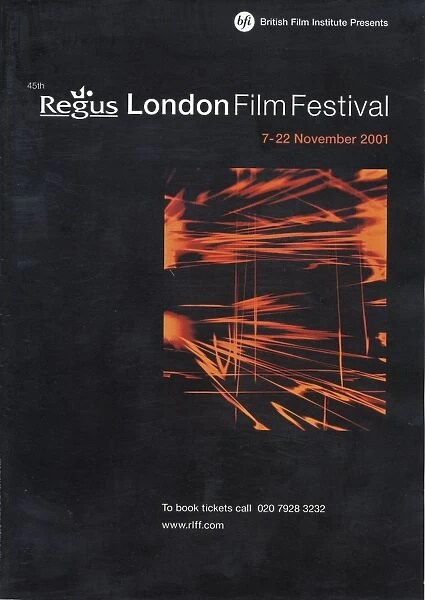
Sooooo.....unless David and everyone involved with the project are all time travelers and they somehow filmed the short in 2005 but took it back to 2001 to show at the festivals?....well, you get the picture.
After SNGH's premiere at the two festivals, it was sold to HBO and Cinemax. It was broadcast in the USA (and yes, you read that right!) on Cinemax beginning in August of 2002. It was shown every couple of months or so until July of 2004. It was first aired on HBO beginning in March of 2003 and was broadcast intermittently until June of 2004. Judging by the broadcast listings, it appears both networks used it as short "filler" material in between their full-length movie offerings. And after those two stopped airing it, PBS in the USA then aired it as part of its Imagemakers series in September of 2005. Here are some newspaper blurbs (with the newpaper titles and dates above them) to prove these broadcasts occurred:

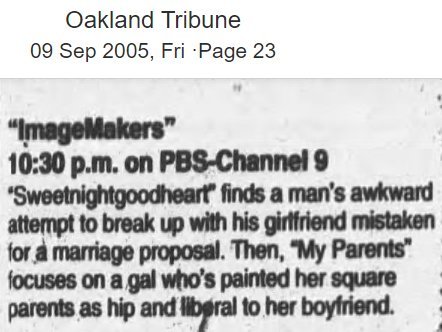
Further proof? On Valentine's Day of 2009, the BFI screened SNGH with its other main features. That screening's entry for the short also says it was released in 2001.

I wanted to find out why IMDb would say 2005, so I poked around a bit. Oddly, its release date information specifies "Hungary" (okaaay?), while sources elsewhere have the 2005 date noted as the date of its "world premiere". The Hungary release date might well be accurate, but I'm not sure exactly what world premiere means...besides, it's obviously an error (since we've already shown it aired in the US in 2002 through 2004). So I think we can safely cross out 2005, don't you?
But ohhhh, we're not yet done on the dates, because some sources also give a release date of 2003! This date, however, is much easier to explain. The 2003 date originates from its initial broadcast on BBC2. It aired as a part of a 50-minute program called Ways To Leave Your Lover (hereafter called WTLYL) at 11:20 pm on 25 March 2003. WTLYL featured five 10-minute short films with a common thread - the end of love. in addition to SNGH, the other four films were Stag, Dog, Unscrew, and Dumping Elaine.
So...now that we've taken care of the date mix-up, let's get into the short itself!
SNGH starred David as Pete, and Kate Ashfield - who he would also go on to star with in a 2002 audio drama called The Island and in 2005's Secret Smile - as Juliet. It also starred Diana Hardcastle as Anthea, Cliff Parisi as Colman, and Thusitha Jayasundera as Yasmin. Here is the archived BBC press release for WTLYL before it was aired.
And the plot? Well, if you haven't yet seen SNGH here's a great plot synopsis which might intrigue you enough to chase it down. It's from the 23 March 2003 edition of the Sunday Times: "Dan Zeff's cautionary tale Sweetnightgoodheart observes [how] David Tennant's attempts to ditch his girlfriend (Kate Ashfield) spiral out of control." And from the
Here are also a couple of photos!
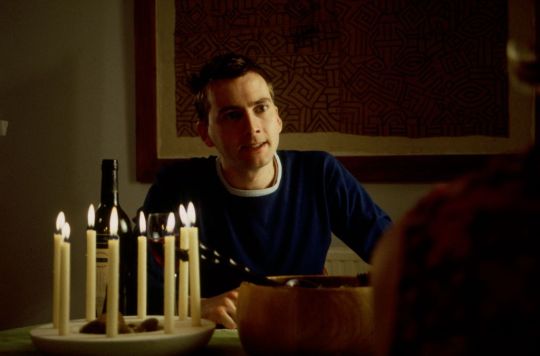
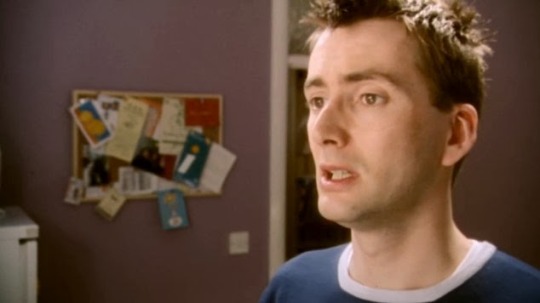
And while we're at it, here are a number of short summaries - and one longer article from the Evening Standard which includes a photo! - which appeared in various newspapers when WTLYL aired in 2003:
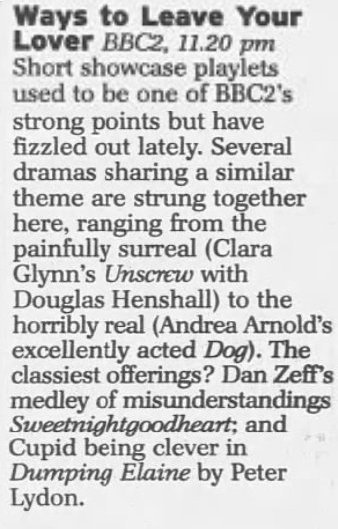


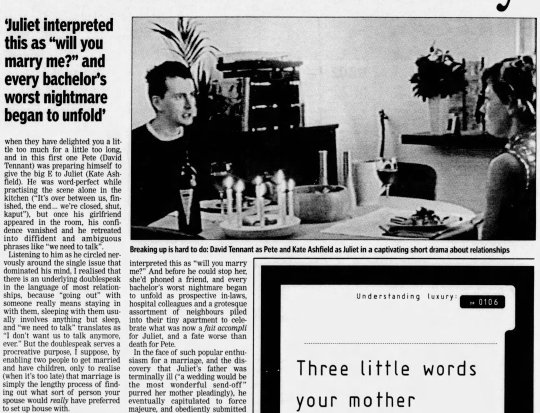
During my research into the origins of SNGH, I've seen the BBC series it featured in variably titled as Ways To Leave Your Lover, and Eight Ways To Leave Your Lover. This discrepancy appears both in print and on the CVs of various actors and crew involved with the project (here's an example). While not confirmed, my belief is Eight Ways to Leave Your Lover was a working title. Five films aired on the program, but I've found an additional two which didn't (which makes me think there was a third whose title I have not been able to ascertain). I believe that at some point in the process, a decision was made to remove three of the films originally scheduled to air, and the name was changed accordingly.
in addition to SNGH, the other four films aired during WTLYL were Stag, Dog, Unscrew, and Dumping Elaine. I didn't find places to watch most of them, but you can see Dog and Dumping Elaine at the links I've provided. Here's what I know about them:
---
Stag - written by Ian Iqbal Rashid and starring Stuart Laing and Nitin Ganatra: a bridegroom wakes up on the morning of his wedding in bed with the best man.
Dog - written by Andrea Arnold and starring Joanne Hill, Freddie Cunliffe and Veronica Valentine: a fifteen year-old girl finds the will to stand up for herself when she witnesses a disturbing and violent incident.
Unscrew - written by Clara Glynn and starring Douglas Henshall and Emma Fielding: a surreal short about a guy whose girlfriend unscrews his penis and takes it with her when they begin separating their belongings after their breakup.
Dumping Elaine - written by Peter Lydon and starring Susan Lynch, Matthew Delamere and Dido Miles: waitresses play Cupid.
---
SNGH is archived at the BFI on VHS and Beta, and in two master forms (16mm/35mm). You can see it there, but I'll save you a trip: while a 4.35G digital copy was made off the master, there's no access to it. The viewing copy MP4 is only 305MB.
If you've read this far, you're probably wondering how you can see it. There are plenty of ways! If you are a registered BFI Screenonline user - and registration is free for users in UK libraries, colleges and universities - you can watch it here (and perhaps download it, though I'm given to understand it's only available for download during certain times). It's also floating around the webs in various forms and qualities on Vimeo, Dailymotion, FilmNow, etc. All of these aren't the greatest of quality, but it's the best we've got. Ah, for a better quality video file taken off the master copy!
But I'd recommend watching it at Dan Zeff's own website.
And that's it for Sweetnightgoodheart. I hope you've enjoyed reading about it as much as I have writing and researching it!
28 notes
·
View notes
Text
The Smell Of Victory: Finding An Elusive Early David Tennant Performance
So anyone who's done research over a long period of time can understand that feeling you get when you find concrete proof of something you've either 1) been told is true, or 2) feel in your gut is true, or both. You're incandescent with triumph.
Tonight is one of those times for me! So I just gotta crow about it.
Anyone who follows me knows I research early David Tennant theatre performances for an upcoming podcast, right?
WELL.
Back in 2016, I had struck up a conversation with a former drama student and classmate of David's. He was a wealth of information, and (besides the other amazing things he told me) he mentioned one production in particular he'd done with David, and that the cast had done three separate runs of this production. I knew of two of the runs - and had plenty of documentation for both of those - so I thought it wouldn't take me long to confirm this third run. Result? Nada. Zip. Nothing.
Fast forward to 2019. I am in conversation with yet another of the actors on this production. He, too, tells me there was a third run of the production, and independently confirms many of the details the first actor shared with me. Despite my complete failure to find proof, I found myself pretty darn sure it had happened. So I began the hunt again, and even contacted the theatre where both actors said they'd done the performance. Result? You guessed it. Zero.
It didn't help that all I knew was that the performance had happened after the first two. It had been over 30 years since they'd performed it, and neither actor could remember enough specifics to point me to anything beyond that.
But tonight, on a lark, I was searching in the British Newspaper Archive...something I've done many times before, of course. But you see, now I have a few years' experience doing these sorts of searches for my day job as an archivist, and I have a few more tricks up my sleeve. And I FOUND IT!
One tiny blurb. That's all. Just one. Of course it doesn't mention David - or any of the actors by name. Just the venue. But knowing everything I know? It's enough.
I love the smell of victory.
33 notes
·
View notes
Text
A little update to my research on an obscure DT project, Only Human (2001)...
So I've just finished an hour-long interview with the creator of Only Human, a pilot episode David did back in 2001. This was a follow up to an interview I did a couple weeks ago with one of its developers.
I'll be doing some supplemental work with them in the coming weeks to make sure all my ducks are in a row, information-wise, before doing any solid writing on it. But after that, you can expect a long-form post on the origins of this obscure David Tennant project.
All I can say is wow! I've learned SO much, and I'm excited to be able to share it!
And if you're reading this but you have NO idea what project I'm talking about, you should go watch Only Human.
It's right here!
25 notes
·
View notes
Text
David Tennant's Obscure TV Appearances: 1989's Biting The Hands
I'm back from my visit with my family and ready to dive straight into my latest find - I'm excited to share I've finally obtained access to David's 3rd earliest TV performance! His first two performances were in 1988: his anti-smoking ad, and in Dramarama: The Secret Of Croftmore. And in 1989 he did a Play On One called Biting The Hands. And I've FINALLY got it!
Biting The Hands has been one of the most elusive pieces of work David did in his early years. First, it wasn't a sitcom or an ad but a one-off play, and it was broadcast in the late 1980s, limiting its exposure to those who might be recording on beta or VHS. It was part of the second series of the prime-time contemporary single TV play series, The Play On One (which was itself a re-tooling of an older series called The Play For Today.) Biting The Hands was directed by Carol Wilks and produced by Norman McCandlish. It was 75 mins in length, and was broadcast at 9:30 pm on 11 Apr 1989.
Here's the play's synopsis: "Linda and Gail are Hell's Belles - an alternative comedy double act. When success begins to beckon, they must decide whether to change their act or keep doing what they believe in. Are their principles justified, or are they just 'biting the hand that feeds them'?"
The writer of Biting The Hands, Rona Munro, was born in Aberdeen in 1959 and is an award-winning Scottish playwright. She started writing professionally in 1981 and has written for film, television, stage and radio. Biting The Hands was Munro's first play for BBC-TV. Given today's excitement about the Doctor Who 60th Anniversary trailer, it might interest Whovians to know Munro wrote the classic DW story Survival as well as the New Who story The Eaters of Light, making her the first (and only!) writer to do both Classic and New Who!
But Munro has yet ANOTHER connection with our dear DT! For their production of Scotland Matters in 1992, the 7:84 Scottish People's Theatre asked established Scottish writers to consider aspects of life in Scotland and write playlets about them. Munro was one of these writers! She wrote a playlet called 'The Fence' for Scotland Matters which concerned the interrogation of a Gulf War peace protester. In a turn around of questioning technique, we are told the story through the security police and not via the protester. David played the protester Keith!
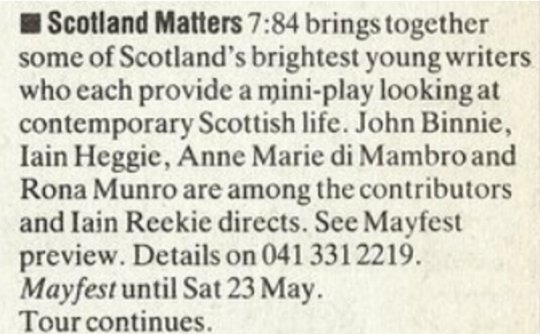
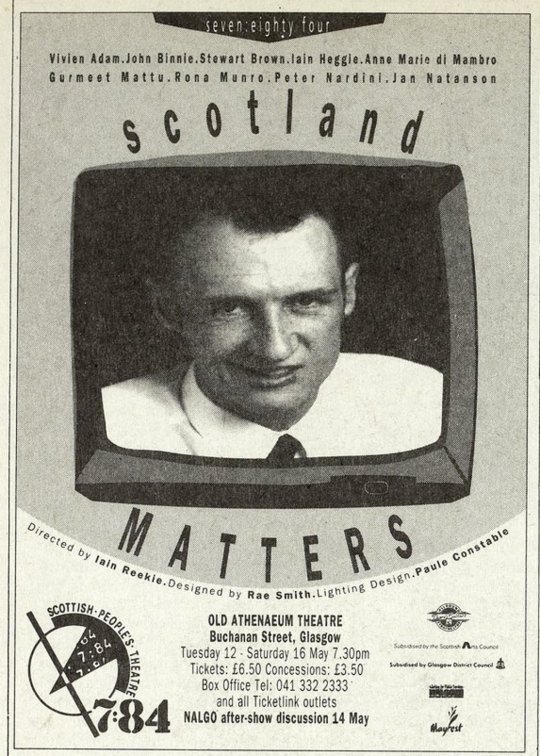
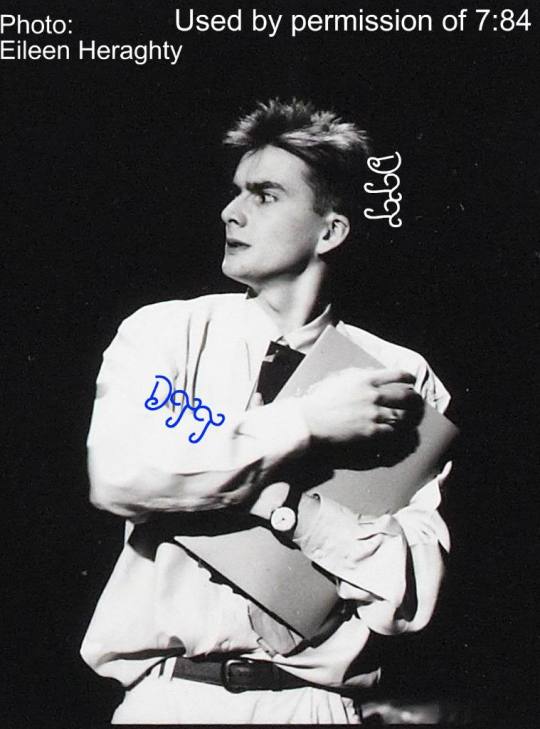
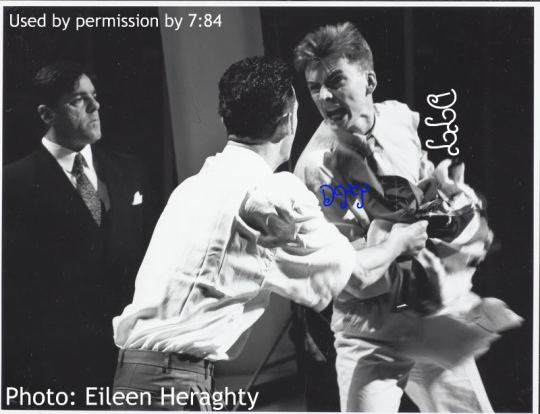
But back to Biting The Hands - which was produced three years before Scotland Matters and filmed when David was still in drama school. Let's take a look at what the play was about, and go more in depth about its stars: Judith Sweeney (Linda) and Louise Beattie (Gail).
Judith Sweeney (Linda McKay) attended David's alma mater - the RSAMD, now the Royal Conservatoire - and graduated in 1977. She played the role of Sally Shaw on the Scottish soap opera Take The High Road. Louise Beattie (Gail Graham) later went on to star in Emmerdale.


Here are a few more articles on "Biting The Hands" from the time of its broadcast:
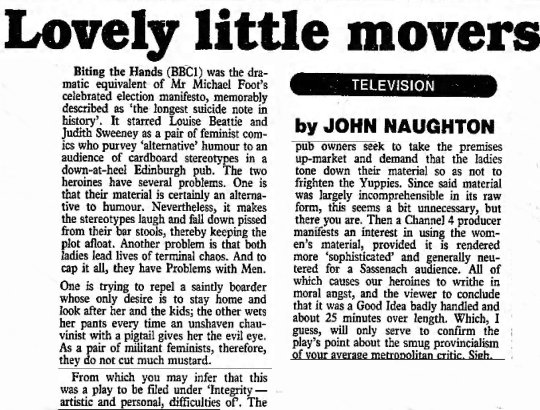

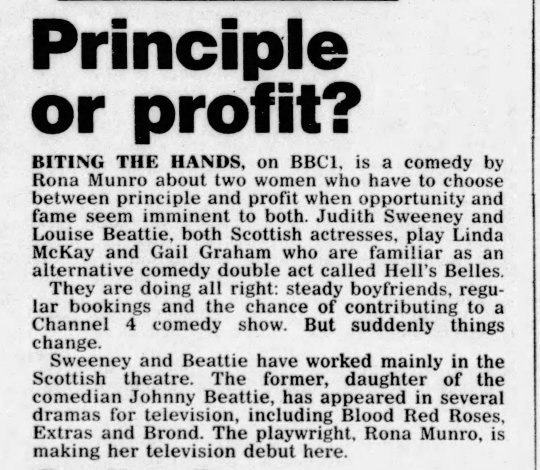
Beattie's older sister Maureen has ALSO starred with DT many times! Among these are For One Night Only (an evening of theatrical prose, poetry, and gossip at the Swan Theatre for the 1998 RSC Fringe Festival) and a 2001 staged reading of Medea at the Cottesloe Theatre. More recently, Maureen has played David’s mother in Deadwater Fell, and Kelly MacDonald's mother in The Decoy Bride!


Now we've been introduced to the stars of the play, and we know what it's about, let's get to David's part! His part begins about 47 minutes into the play, and it's a role which makes up a total of about 20 whole seconds. He plays one of three squaddies (low-ranking military) and is in a group of soldiers who travel on the train the main characters Linda and Gail board in Edinburgh to go to London - but he's not seen in this particular scene. After the ladies board the return train back home to Edinburgh, by coincidence these same squaddies happen to be traveling on their train. David's character is the only one of the squaddies to speak, and his words entail wolf-whistles at the two women and calling them "Pet"! Here are some screenshots:

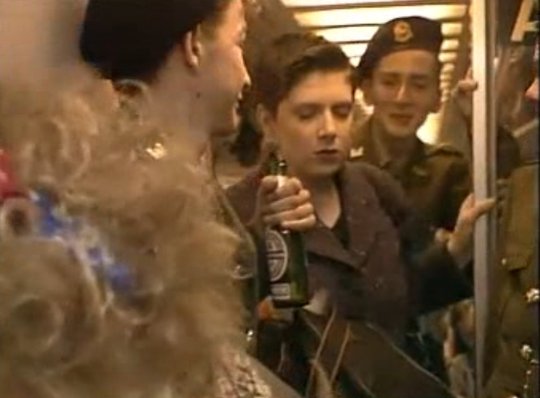
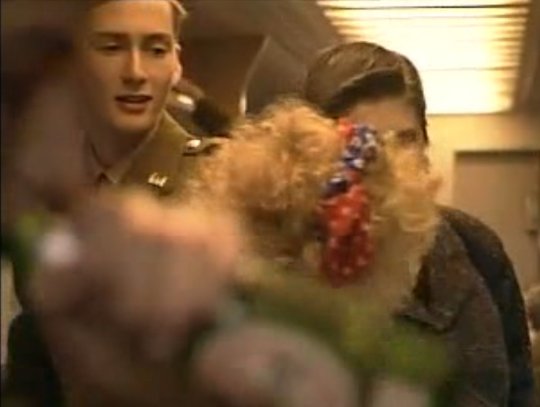
In a later scene, Linda and Gail happen to bump into another friend on the train, and the three open a bottle of liquor and sing and drink. David's character sings and drinks with them. Here are a few screenshots of that short scene:

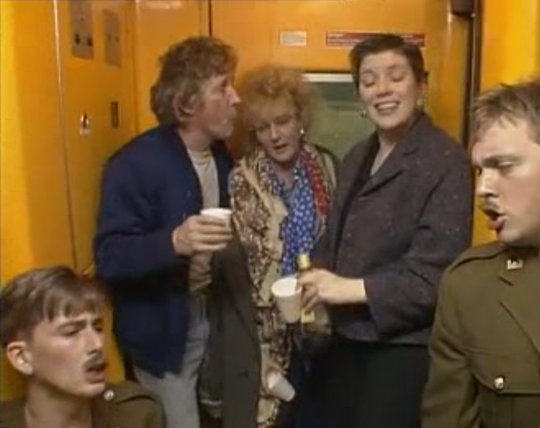
You may notice in the first set of screenshots David is clean shaven & in the second, he sports a mustache. These scenes all supposedly occur on the same train from London to Edinburgh so it seems there's a continuity error here. Perhaps these scenes were shot at different times?
These short scenes are the only times David appears in the play. He's given credit in the end titles. Of significance, though, is he is NOT credited as the "Third Squaddie" (a designation I've seen all over the Internet for close to a decade). He's just the third squaddie listed.
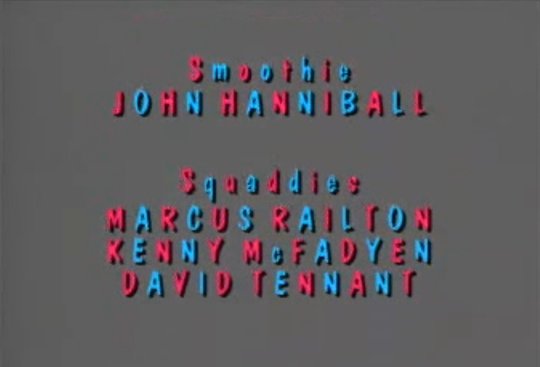
The BFI (British Film Institute) holds a VHS video recording of Biting The Hands. The copy is in "pending" status, which means it's unlikely the copy can be viewed.
Before I close this post on Biting The Hands, two more little benefits: here are its opening sequence, and its title frame!
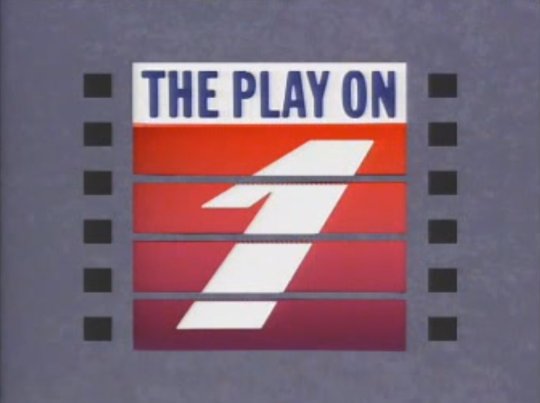

41 notes
·
View notes
Text
For One Night Only: David at the RSC Fringe Festival (oh, and one other thing he probably didn't do...)
For today's post in "obscure things David Tennant did way back when," we'll need to travel back in time to the late 1990s.
It was a busy time for David. By May 1997, he'd just wrapped up his first Royal Shakespeare Company repertory season (in which he simultaneously played Touchstone in As You Like It, Jack Lane in The Herbal Bed, and Alexander Hamilton in The General From America). This set of three plays had begun their runs in Stratford in early- to mid 1996; they then transferred over to London's Barbican Theatre, where they had ended their runs by mid-1997.
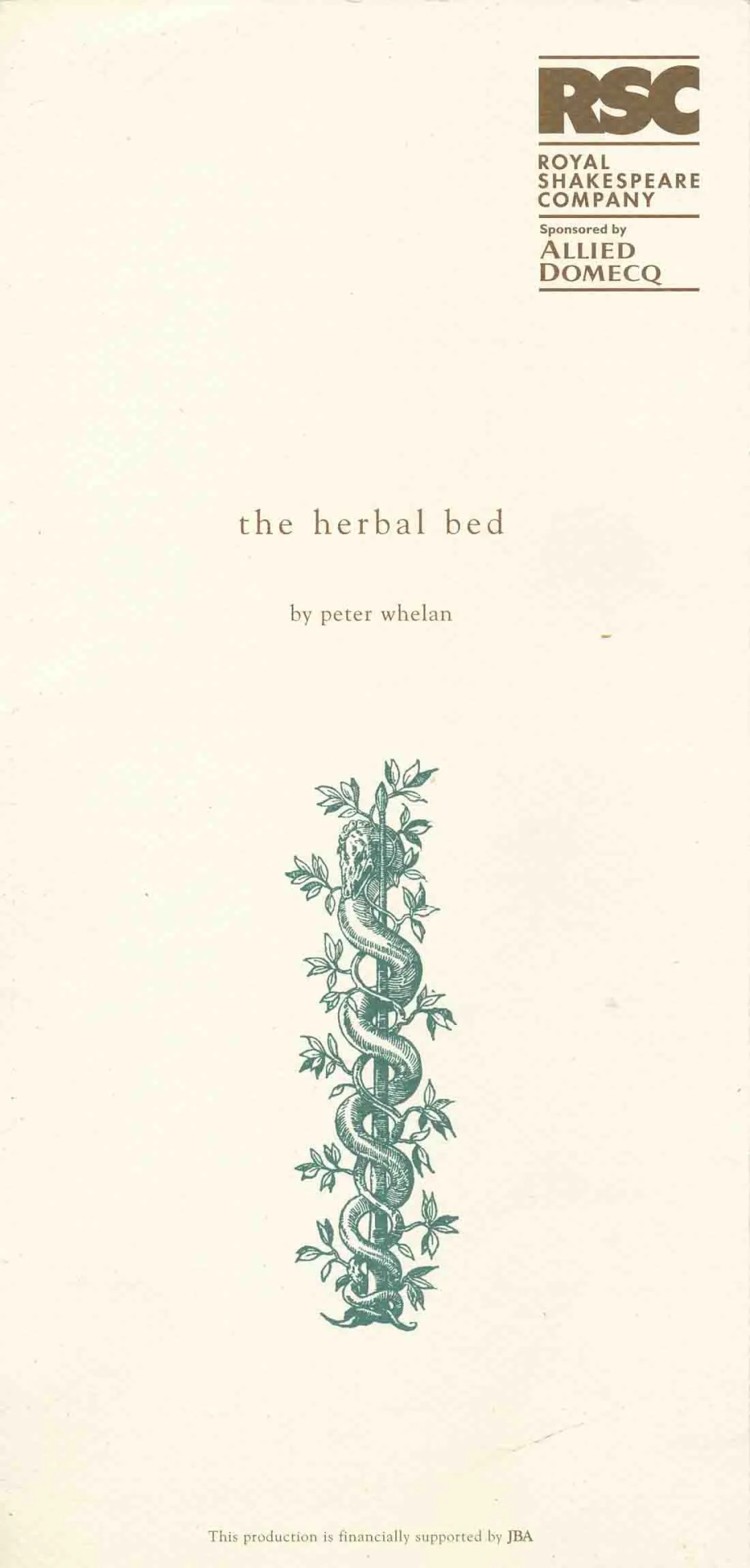
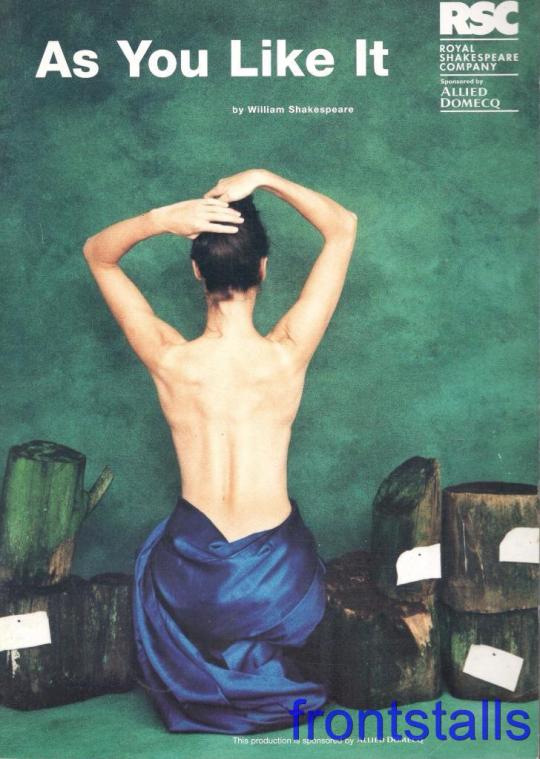

Programmes for The Herbal Bed, As You Like It, and The General From America
Next on David's theatre agenda was the role of Mickey in Hurlyburly (a play I've talked about before) which ran at the Queen's Theatre in London from August to November 1997. He then performed a one-off staged reading of Derek Jarman's Blue at the Chelsea Arts Theare on 16 November 1997 (which, by the way, is another little-known DT performance I want to explore!)
That was it for 1997, theatre-wise.
Then, beginning in March of 1998 - as I've explored previously - he began his run as Moon and Brindsley Miller in The Real Inspector Hound/Black Comedy. This double bill ran first at the Yvonne Arnaud Theatre in Surrey and then in London, first at the Richmond Theatre and then at the Comedy Theatre. That play finally wrapped in August 1998.
But a month before wrapping The Real Inspector Hound/Black Comedy, David had popped over to Stratford to do something interesting, something that's the focus of this thread. It was called For One Night Only, and - as it says on the tin - it was, indeed, for one night only!
First, though? A little history!
Around 1990, the RSC began to hold an annual summer festival called the Royal Shakespeare Company Fringe Festival. Intended as a showcase for RSC talent, it included a mix of events: short plays, devised pieces, stand-up comedy, concerts, etc., as well as new works making their Stratford debut. The festival lasted two weeks and saw actors, directors, stage managers, musicians and staff all taking part in more than 25 events. All the events were either on Sundays, or timed around RSC productions, so audiences could go see fringe shows after seeing the actors perform in their usual RSC roles.
Most of the events for 1998's festival took place in a specially adapted 100-seat rehearsal room at the RSC's 'alternative' theatre, The Other Place. But not all of them. Their opening night event - on Sunday, 19 July - was to take place at the Swan Theatre.
That opening night event? For One Night Only!
Starring Desmond Barrit, Emma Handy, and Amanda Harris as well as David, the launch event cost £4-£12 and began at 7:30 pm. It was called a "curtain raiser" as well as "aptly-named."
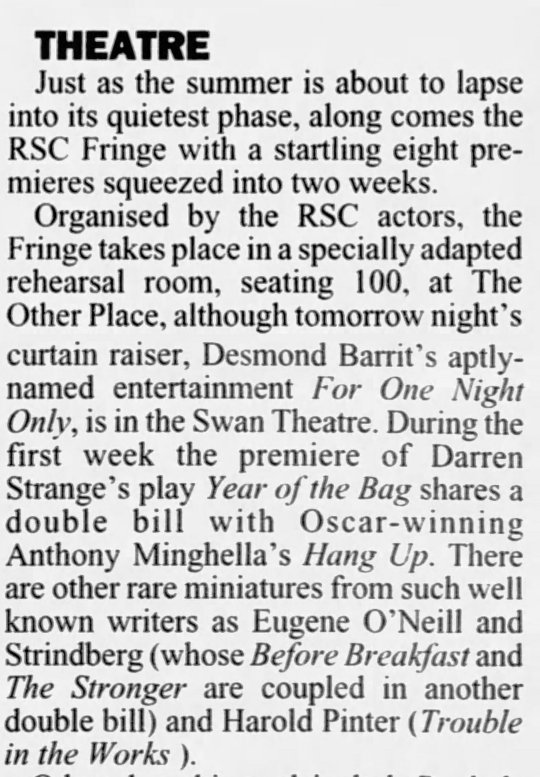
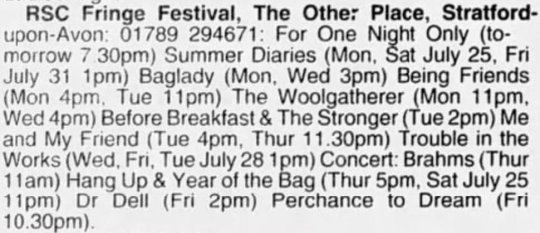
And just what was it about? Well, um....I know it was organized and compiled by its star, Desmond Barrit...and that it was supposed to take its audience on a journey through the theatre. These articles say so.
But that's about all I know. I wish I had more details.
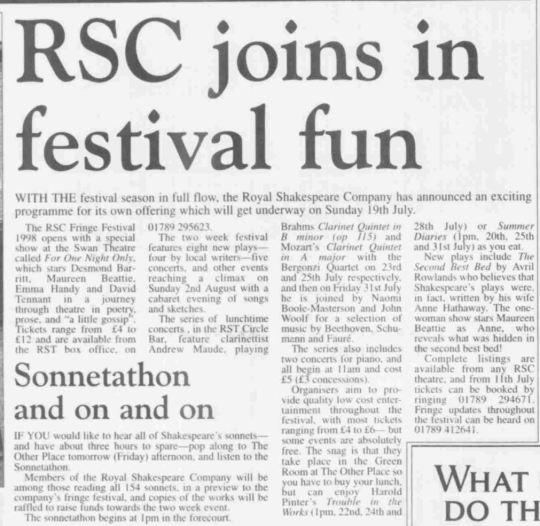
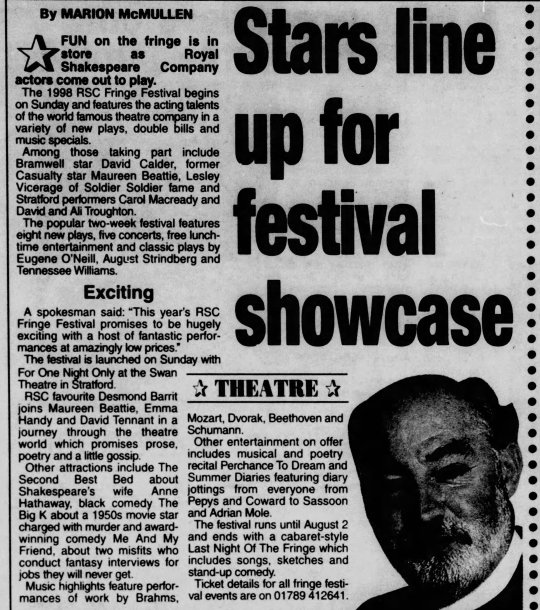
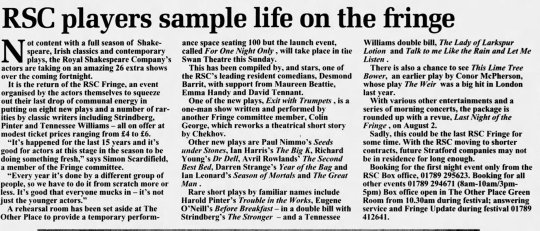
I am, however, supremely lucky to own a piece of ephemera about this one night only event.
Here's the front and back of my For One Night Only flyer, and as I'm sure you'll notice, it promises "an evening of theatrical prose and poetry...and a little gossip!"
Great. Could you tell us a bit more, thanks?
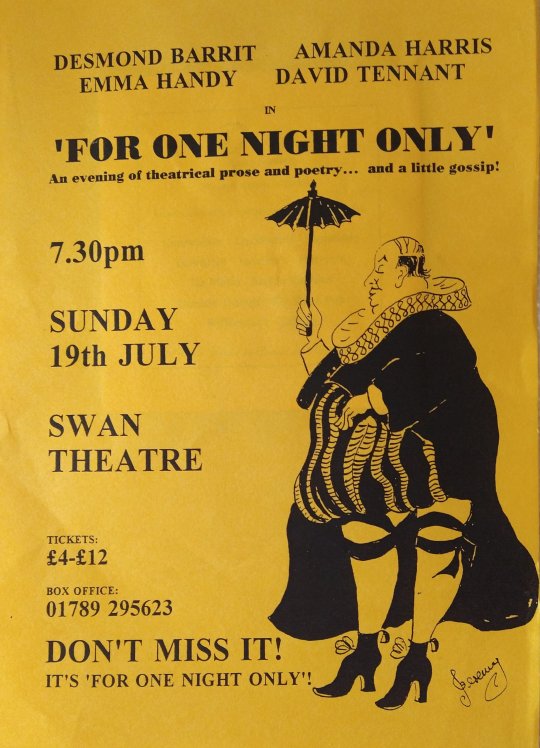
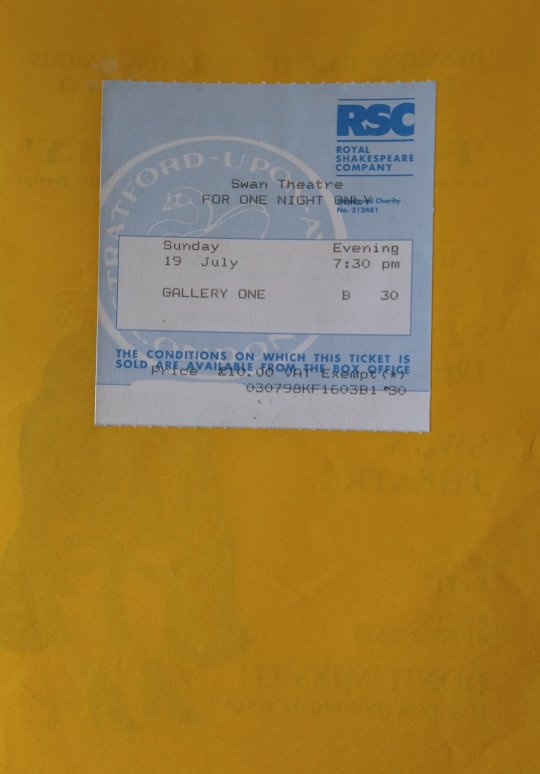
While researching For One Night Only, I came across something else of interest, which I thought for a moment David might have been involved in - an event staged nine days before For One Night Only. But after researching this event in more detail, I don't think he was involved, after all. Such a shame, really. He would've been perfect!
On Friday, 10 July 1998, at 1 pm in the afternoon, some Royal Shakespeare Company members got together to do a fund raiser and preview of the upcoming Fringe in the forecourt of the Other Place. Called a Sonnetathon, this three-hour event featured various RSC members reading all 154 of Shakespeare's sonnets!

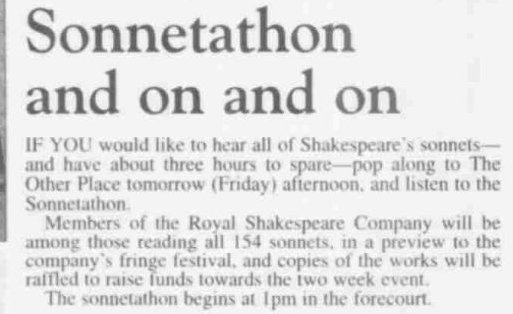
Now a Sonnetathon would've been right up David's alley, am I right? He'd have loved it! But I'm about 99% certain he wasn't there - and here's why. That Friday night at 7:30 pm, David was onstage in The Real Inspector Hound/Black Comedy at the Comedy Theatre in London, that's why!
But here's why I say 99%. It's not impossible to imagine he got up early that Friday (after doing a show the night before) and took the train in to Stratford to do the Sonnetathon - wrapped it up by 4pm, then hopped on another train back to London in time to make the 7:30 curtain up for The Real Inspector Hound/Black Comedy.
But you have to admit, it seems unlikely.
But The Real Inspector Hound/Black Comedy wasn't showing on Sunday, 19 July 1998, so David was able to get to Stratford and go onstage as part of 'For One Night Only' to open the Fringe...and then get back to London in time to go onstage once more the following night.
So now you know what I know about For One Night Only.
Of course I'll keep looking for more!
30 notes
·
View notes
Text
David Tennant as a Narrator: DT Goes A Bit Space-y, Pt. 1 - We Are Astronomers (2009)
If you're a fan of David's, you're used to using all sorts of ways to see and hear him perform. You might turn on the television to watch him in shows like Doctor Who or Good Omens. You might flip on your media player of choice to listen to him do sixty-gagillion voices in Cressida Cowell’s How To Train Your Dragon series of audio books, or you might catch him on the radio doing Chase UK bank or Virgin Media adverts. You could even fire up Just Cause 3 or Call of Duty: The Final Reich to catch him in a video game.
But did you know you could also go visit your local planetarium?

David's work as a narrator is just as rich and wide-ranging as all the other aspects of his acting career. So for today and in the following post, we'll take a look at two of these narrative productions connected by a common thread - space.
Come with me back to 2009. It was the International Year of Astronomy (IYA2009), and Edinburgh-based charity Dynamic Earth had received funding from the Science and Technology Facilities Council to partner with a number of UK-based organizations - including the Armagh Planetarium, the Centre For Life, INTECH Science Centre & Planetarium, the National Space Centre, Royal Observatory Greenwich, and Spaceport - to create a 25-minute long 360° full-dome show for planetariums and digital dome theatres called We Are Astronomers.
And it got the then-current Time Lord, David Tennant, to narrate it.....
----
Read further right here on Substack.
Leave comments for me there, or come on back here and tell me what you think!
20 notes
·
View notes
Text
DT talk throwback: my interview w/David Blair, director of Takin' Over The Asylum
Over half a decade ago now I was a writer for David Tennant News/DT Forum, one of the bigger unofficial fan sites of DT's at the time (now sadly defunct). During my time there, I got the chance in Jan 2016 to interview David Blair - most notably the director of Takin' Over The Asylum, though he worked with DT in three other shows - about those projects, and what he remembered about David. I didn't want this interview to sink into the depths of the Wayback Machine and I thought y'all might enjoy reading it, so here is that interview in its entirety:
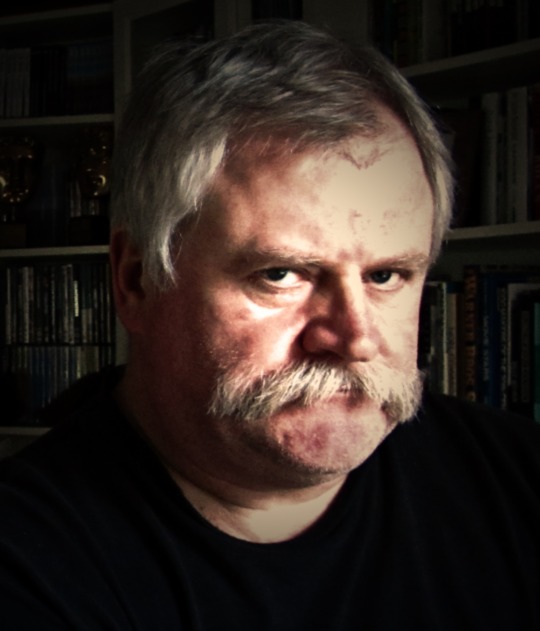

David Blair, Director / Front Cover of BBC DVD for Takin' Over The Asylum (UK)
Hello Mr. Blair! From 1992-1996 you worked with David Tennant on four separate television shows: Strathblair in 1992, The Brown Man in 1993, Takin' Over The Asylum in 1994 and A Mug's Game in 1996.
Were you at all involved in the casting process for Strathblair, the first project you worked with David on... If so what did you see in the young actor that won him the role? And how did that translate into choosing him as Campbell Bain?
I was a Producer at the BBC before I started directing. David was a student at the Royal Scottish Academy of Music & Drama in Glasgow. He asked if he could meet me just to talk through procedure for TV, interviews, etc., as the college appeared more interested in theatre than camera. Indeed, frowned on the latter! He’d be about 18 then. I certainly knew from the outset that he ‘had something,’ and I gave him a few minor opportunities as soon as I embarked on my directing career. To be clear, I only work with actors I want and believe in – still do. Some might say my own career has been stifled by this obduracy but I don’t care. My need of working with great actors is paramount and David’s a shining example of what makes it all worthwhile. I commissioned Takin’ Over The Asylum for the BBC and worked closely with the writer throughout the creative process. I knew as soon as I read the screenplay, David was going to be perfect for Campbell. But I’m not a fascist about this kind of decision-making, so I mentioned to the writer and Casting Director I had a boy ‘in mind’ for the role. I didn’t oversell; I knew he would make it work for himself. There may have been some minor scepticism at first, but when he did his audition, he blew them away.
youtube
David's audition tape for Takin' Over The Asylum
Many of David's fans have seen Takin' Over The Asylum and are well-versed with it. Can you talk more about Strathblair, The Brown Man and A Mug's Game, and David's roles in each? Little is known about the roles he played in those productions. Can you give us any insight into the stories behind all three of the projects themselves, and what was it about David in those years that made you want to cast him in all of them?
In truth, Strathblair and The Brown Man were merely cogs in my directing wheel. They weren’t aesthetically of great merit but gave me a few credits to kick-start my career. What I needed was a ‘signature piece’ and that came along with Takin’ Over The Asylum. In many ways, I regard that as the start of my directing career. In those days, without a high-profile production on your CV, you would more than likely be destined for a treadmill of soaps and ‘continuing drama’. Before Asylum I was picking up scraps; after it, I was being asked what I wanted to do. Thus A Mug’s Game became my second collaboration with Donna Franceschild, who’d written Asylum. Ken Stott, Katy Murphy and others from Asylum were already on board - and really? We just wanted David to ‘be in it’. It wasn’t a huge role but he kindly agreed to come in and do it for us. Played a music student (at the Scottish Academy, as it happens), as I recall but, again, hugely professional and accomplished. In one scene, he had to throw up over the railway tracks at Partick train station in Glasgow.... ah, an enduring memory.....

Did David do anything on set of any of the productions he worked on with you that totally took you by surprise or that was unexpected? What did he do?
I think in those days, more than anything, it was important to keep in mind just how young he was. This boy of 21, was commanding the space, displaying an extraordinary ability to create laughter and tears; sometimes both at the same time! He had natural charm and wit and that, combined with this wonderfully spontaneous joie de vivre, made him a joy to be around both on the set and off.
What do you feel David's most unique/valuable attributes as an actor are? What do you think separates him from his peers as he has matured into the career he has today?
When I look at him now I still largely see the same lad I met all those years ago. Still bursting with enthusiasm and an absolute desire to come out on top – which he’s done consistently. He’s retained his appetite, clearly, and devoured a huge range of roles – never seeking a ‘comfort zone’ in the process. It’s also struck me that he’s never attempted to be somebody he’s not and that truth, integrity, diligence – some might say, ‘Scottishness’ (!) – defines the man we see today.
David has said he considers Takin' Over The Asylum a career-defining project for him. What is your reaction so many years down the line to that comment?
I’ve always been rather humbled by David’s regard for myself and Takin’ Over The Asylum. I genuinely never felt I did anything out of the ordinary. I picked the best man for the job which, God knows, he underlined in spades once he played the role. He gave me as much as I gave him. Of course, there are occasions in my own career where I look back at defining moments and say “if it hadn’t been for so-and-so”.... but, I guess, the reason why we can reflect in that way, is because we didn’t let anybody down. David didn’t – and I hope I didn’t.
Looking back at Takin' Over The Asylum all these years later, do you feel it still holds up as well as it did? In retrospect do you feel it helped shed as much needed light on the mental health industry as you'd hoped?
Funnily enough, somebody called me the other day to say he’d sat down and watched all six episodes and couldn’t believe how well it’s stood the test of time. I think I agree. I suppose because it’s a subject matter nobody would touch with a bargepole these days – that’s keeps it fresh somehow. All the scripts were vetted by the Association For Mental Health before we signed off on them. The writer had had mental health issues and wanted it to be authentic and in no way derisory. In fact, I remember many of the extras I cast all had had mental issues – one in particular having been institutionalised for 37 years!
I'd like to explore your decision to cast institutionalized patients as extras in Takin' Over The Asylum in a bit more detail. Was this related to filming the series at Gartloch Hospital, and if not, how was the idea first presented and eventually implemented? Was this something you and Donna discussed as part of your intention to make the show as sensitive to the subject matter and as authentic as you could? And did you run into any problems with compensating the extras, or any other issues relating to their Sectioned status?
It was simply an idea I had not just to add authenticity, but to have these guys make a worthwhile contribution to the film – and also make them feel good about it, if you like. I wanted to dispel the notion that all mentally ill people were screaming banshees – the story alludes to this anyway – by whose definition are we mad? I also thought it would help the non-mad actors (if there is such a thing!!!) to be surrounded by the ‘real’ rather than the ‘made up’ and thereby enrich their own performances.
Speaking of Gartloch Hospital, how did you choose that particular hospital for the filming location?
Gartloch was one of several mental hospitals around Glasgow being run down at the time, as part of the government’s controversial ‘care in the community’ programme. In other words, ‘we don’t want to pay to look after them any more, so you do it’. Of all the ones I looked at, Gartloch – not least with its huge tower – seemed to provide the best ambience; most suitable for the story and visually rewarding also.
youtube
Exploratory views of the interior and exterior of (now abandoned) Gartloch Hospital
As you mentioned, you do certainly seem to gravitate towards actors and writers that inspire you. Years ago you spotted a certain something in David -- so if given an opportunity, would you be willing to work with David again and if you could choose your own ideal role for him, what would that role entail?
Nothing would give me more pleasure than finding a project that both David and I could work on. David, creatively, is a bit of chameleon, so I don’t think there’s an ‘ideal role’ for him as such. A brilliant piece of writing and a character that takes him a place he hasn’t been before would be the simple remit.
Over the years many fans of Takin' Over The Asylum have expressed their desire to know what happened to Campbell and Eddie after we left them. If you were to continue their story, where do you think Campbell and Eddie would be today?
My hunch is that Campbell would have gone on to be a success in the music industry and Eddie would have tumbled into an even darker place, fueled by alcohol and self-doubt. I’ve often imagined Campbell inadvertently bumping into Eddie while he was sleeping in a cardboard box and Campbell doing for Eddie what Eddie had done for Nana in the very first episode.
Lore is - from Donna amongst others -- that you asked her to take a minor character from a play she'd written and make a drama around him. Of course that character is Ready Eddie McKenna. Could you tell us what the name of that play was? And what was there about Eddie in the framework of that play that made you see him as the kind of character that could carry an entire series - and that Donna was the woman to write it?
With regard to the question below, it’s strange how little fateful moments define what we are and what we do. In my early days as a Producer, I commissioned Donna to write one of four monologues I was overseeing – I didn’t direct it, as it happens, but it was a sterling piece performed by Katy Murphy. The BBC – not myself – then commissioned Donna to adapt a stage play she’d written called And The Cow Jumped Over The Moon to fit a play strand we were doing at the time.
On the day of the studio, the Producer overseeing the project, was taken ill and they asked me to fill in for her ‘in the gallery’. (This was an old TV play where you worked in a rehearsal room for, say, three weeks then shot the whole thing – multi-camera – in a matter of days). Of course, as a result, I became familiar with the material and was indeed taken by this minor character – Eddie – who was a hospital radio DJ. After that, I asked Donna if she felt there might be mileage in creating a serial based around this character. I’d love to go into great and meaningful depth about why I thought that but, in truth, it was just a hunch – although it was one relative to how Donna was writing at that time; I believed she could deliver something unique with wide appeal. She hadn’t done any original TV work at that time (apart from the monologue) and had worries.
It took her some time to finally come up with a first draft – the breakthrough, she told me, came when she switched from just a hospital to a mental hospital. After that, we worked the episodes one at a time getting precisely where we wanted to be on one, before moving on to the next. Not an option that’s often available these days. During this process both Donna and I were supported hugely by the then Head of The Department, Bill Bryden. And that support manifested most clearly in simply leaving us to our own devices. No script executives, story editors or any other distractions. The work we ended up with had the footprint of nobody but ourselves.
And that's that! I hope you all enjoyed this unique insight into Takin' Over The Asylum and DT's work with David Blair.
#DavidTennant#TakinOverTheAsylum#InterviewWithDavidBlair#AMugsGame#Strathblair#TheBrownMan#ObscureDavidTennantPerformances#Youtube
28 notes
·
View notes
Text
Update: new info about David Tennant's elusive 1996 short film Quality Control!
I've got a few new updates to add to this post I did a while back about a short film David Tennant did in 1996 called Quality Control. If you haven't yet read my first post about this short film, you can read it at the link I posted above. And then come on back!
Firstly, Quality Control was broadcast many more times than I thought it was! I thought it was only broadcast four times between 1996 and 1998, so imagine my surprise when I did some digging and found it had actually broadcast eleven times between 1996 and 1999. Oops!
But by far the biggest update I have on this short is that recently I've discovered why it was made...and by whom!
But first, the updated broadcast list:
BROADCAST DATES:
1996:
4 Jan 1996 - 1:55pm - Channel 4
10 Jun 1996 - 1:55pm - Channel 4
9 Dec 1996 - 2pm - Channel 4
10 Dec 1996 - 1:30pm - Regional S4C
1997:
18 Jun 1997 - 10:45am - Regional S4C
25 Jun 1997 - 10:45am - Channel 4 & Regional S4C
1998:
8 Feb 1998 - 3:30pm - Channel 4
26 Oct 1998 - 1:30pm - Channel 4
6 Nov 1998 - 1:30pm - Regional S4C
1999:
18 Jun 1999 - 1:30pm - Channel 4
29 Jun 1999 - 1:30p - Regional S4C
Of course now that I've found these, I'm aware there may be other broadcast dates I have yet missed. If so, I didn't find any past 2000. But I reserve the right to be mistaken, ha!
Now here's the bigger update: the why, and the who!
Published 23 June 1995 in The Scotsman, here's the article that broke it wide open for me, and its relevant quote:
"Simplicity and technical finesse marked this year's graduation films at the Edinburgh College of Art degree show. While Hannah Lewis's Quality Control makes excellent use of a superior comic performance by David Tennant as a youth trainee on his first day in a Leith sweatshop…"
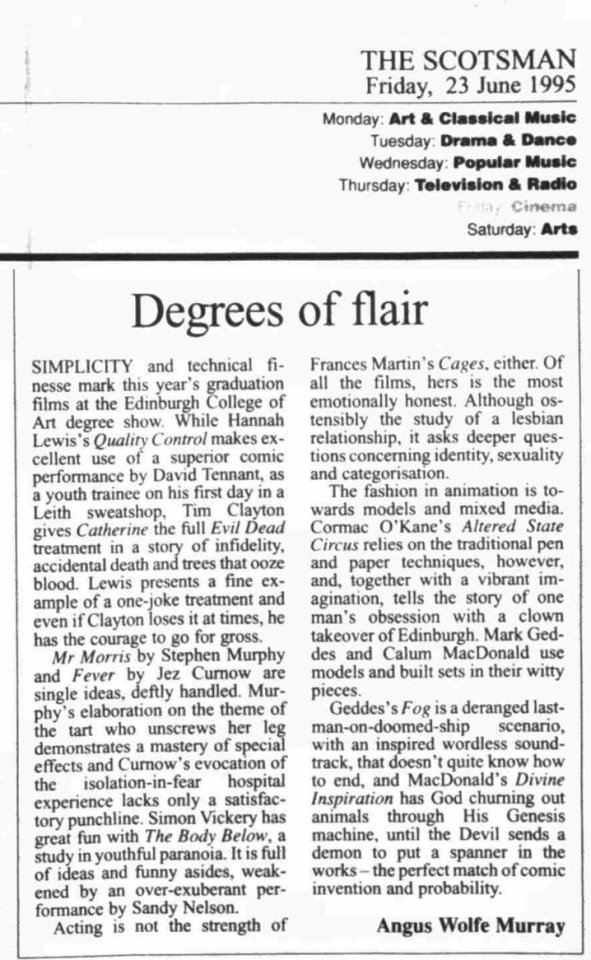
WOW, right?
But this new information leads to all sorts of other questions. If this short was initially part of a degree course, how did it make the leap to broadcast? Was it in one of the short film UK production schemes happening at the time which were helping new film creatives launch their ideas: i.e., First Reels, Tartan Shorts, New Found Land?
I'm not sure. At first blush, Quality Control doesn't seem to have been included in a larger broadcast of shorts like Bite and Spaces had been (Bite was shown on the program Don't Look Down on STV, and Spaces was shown on STV as a part of First Reels.) In its broadcast listings, Quality Control is always listed on its own.
The description the article gives on the short is also very interesting. The article says David played a youth trainee on his first day in a Leith sweatshop. But reviews and blurbs of the short's plot in newspapers say he was a job trainee who becomes a quality controller/inspector at a skateboard factory. It seems to me that a sweatshop and a skateboard factory are two very different places, but are they? Was that changed somehow between its showing at the College of Art degree show, or was it just the article writer's bad description?



Blurbs about Quality Control from various newspapers
And just who is Hannah Lewis, its creator? Well my money's on producer Hannah Lewis, who's worked with Morag McKinnon and Colin McLaren. They all met at the Edinburgh College of Art, and had made three shorts together by 1999 (one of which, 'Home', won a BAFTA!) But if she is the right Hannah Lewis, Quality Control isn't listed anywhere on her IMDb. So while I can't be sure she's the short's creator, the time is right, and the place is right. A lot of the dots sure do line up!
Now we know why it was done - and who did it - can we find it? Is it archived somewhere? I haven't found it so far if it is - at least it's not archived at the Moving Image Archive in Glasgow, or at the British Film Institute. But I've yet to check to see if the Edinburgh College of Art may have it.
As far as all the other questions this raises - like how did David get involved with the project (since he was living in London at the time) and if he knew someone who knew someone who...ya know? Pfffft. Your guess is as good as mine! It's one more "I dunno" to add to the pile.
In conclusion, we may be as close as we've ever been to finding out more about David's elusive 1996 short, Quality Control.
I'll keep on searching!
23 notes
·
View notes
Text
David Tennant audios: a plethora of Macbeths (but this one's just MacB)!
It's been a while since I've delved into a lesser-known David Tennant project, so let's see if we can't fix that, shall we? And especially since he's currently at the Donmar Warehouse doing Macbeth, I've got just the thing to showcase!
(And no, it isn't his 2005 role as the Porter in Arkangel Shakespeare's audio version of Macbeth, though that IS cool! And it's not the more recent April 2022 version of Macbeth he did for Radio 4 with Daniela Nardini as Lady Macbeth and Stuart McQuarrie as Banquo - two actors he's worked with in the past; Nardini in Antigone for the 7:84 back in early 1993, and McQuarrie in a 1994 production of John Byrne's The Slab Boys Trilogy at the Young Vic in London.)
No, this is yet another Macbeth-adjacent project. It was something David did in September of 2009 for a BBC Radio 7 programme called Big Toe Books. I'll say up front that I wish I knew a LOT more about this project than I do...but I just don't. So I'll tell you what I do know.
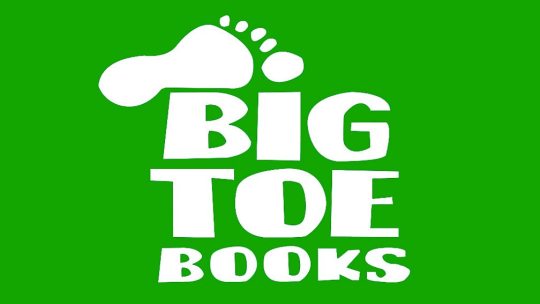

But first, a bit of history:
The Big Toe Radio Show - a children's programme aimed at children aged 9 to 11 and which featured games, music, and stories read from well-known books - ran on BBC Radio 7 from 2002 to 2007. When it ended in 2007, the BBC created another show with an adapted format to replace it called Big Toe Books.
Big Toe Books was an hour long show of book readings for older children 8+, which transmitted at 4pm. It featured presenters Kirsten O'Brien (2007-2009) and Chris Pizzey (2010-2011) and lasted until 2011, when it was axed. At the same time, Radio 7 was rebranded as a BBC Radio 4 spin-off station, Radio 4 Extra. At the time, Big Toe Books' listenership was about 136K, but only 21K were children.
Now you're probably wondering how all my ramblings about children's programmes ties in with Macbeth, right? Well as I said previously, David was a guest reader on Big Toe Books, and at 4pm on 14 Sep 2009, he read a book by Neil Arksey called MacB!
And there's the tie-in!
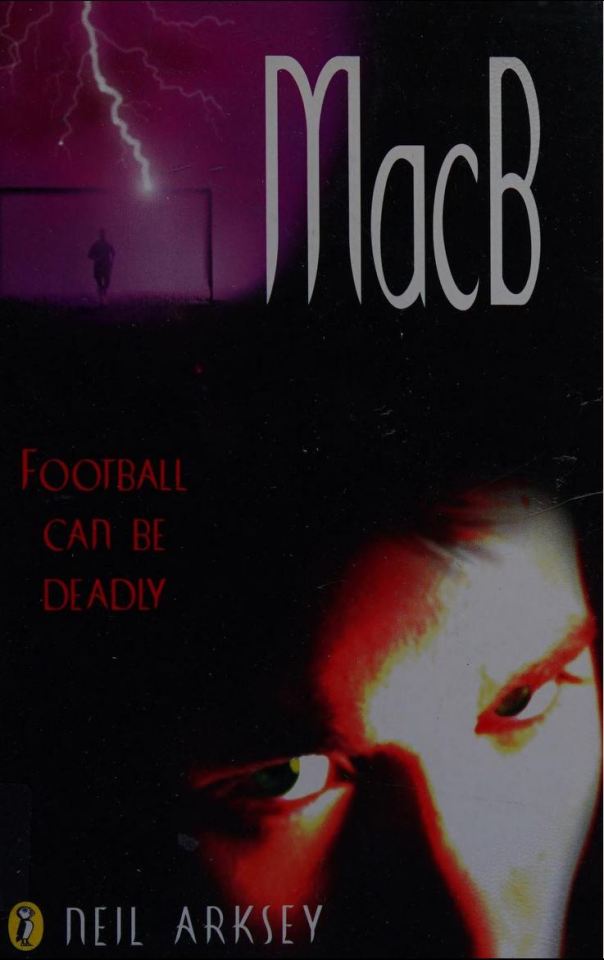
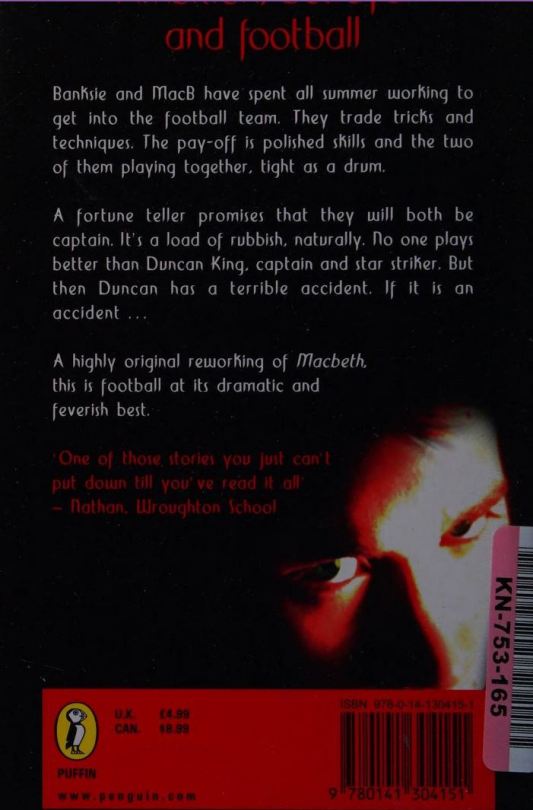
Here are a few blurbs from various newspapers featuring the listing for the show - and oh, incidentally, if you look at the 6pm slot, you'll see a show called Seventh Dimension. That show was a speculative fiction show of various kinds - and in early 2007, it featured a series of original Doctor Who audio dramas starring Paul McGann as the Eighth Doctor!
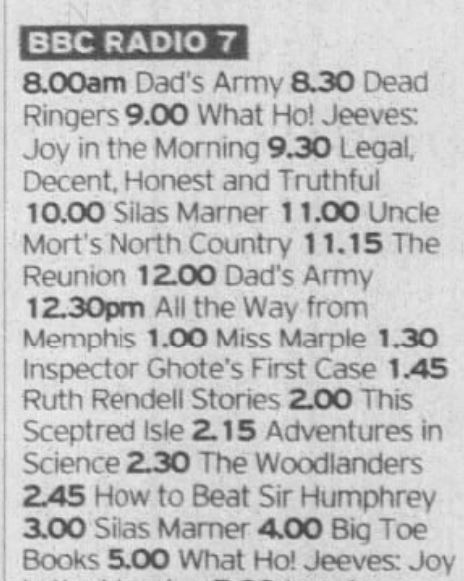
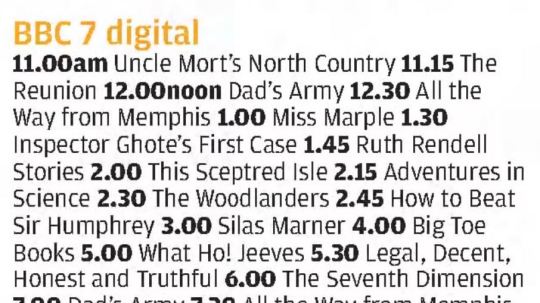
But back to David and MacB.
Now Arksey's book wasn't the Macbeth we're familiar with…not really. Firstly, his book was written for young adults. Secondly, it was based on Macbeth the play, but Arksey set it on the football field rather than the Royal Court. Here's a summary of the plot:
"It tells the tale of two best friends, Banksie and MacB. The two train together at football all summer in the hopes of getting onto the football team. When a fortune Teller tells them both that each would be captain, it seems unlikely, especially as they are up against star striker Duncan King, the most likely man for the job. When Duncan has a terrible accident that means he can't play, Banksie has suspicions about whether it really was an accident after all. Was it fate, or did MacB have a hand in it?"

And that's pretty much all I know about David's stint as a guest reader for BBC Radio 7 programme Big Toe Books, reading Neil Arksey's book MacB (which was originally published by Puffin in 1999). Like I said, I wish I had more information about this audio drama. But this little bit is all I've been able to find.
And oh, if you want to hear it, go here! I won't tell if you won't!
18 notes
·
View notes
Text
David Tennant's Plays: An Experienced Woman Gives Advice (1995)
I haven't done a thread on any of David's plays in a while, so I had some time yesterday to rustle one up about his 1995 play, An Experienced Woman Gives Advice. It premiered 28 years ago yesterday (which was why I chose to do a deeper dive about it) so let's get into it!
An Experienced Woman Gives Advice (I'll use EW to refer to the play from here on out because what a long title!) would be David's first time performing onstage at the Royal Exchange Theatre in Manchester.
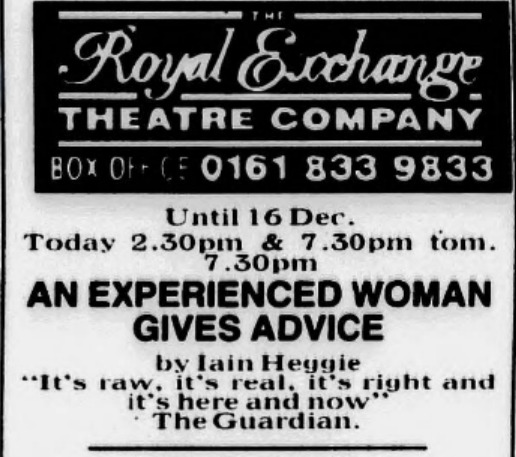


Prior to winning his role in EW, the last play David had done was What The Butler Saw as Nicholas Beckett, a role he was warmly praised for. What The Butler Saw ran for two months at five different venues around England before closing its run at the Nottingham Theatre Royal in late May 1995.
EW's playwright, Iain Heggie, had seen phenomenal success with his 1987 tour-de-force, A Wholly Healthy Glasgow. But in the years afterwards, Heggie had produced only a few more plays before deciding he'd rather go back to teaching and let his writing commence at its own pace.
Originally written as a miniature sex comedy, EW was long in development, and received further script development workshops at the Royal Scottish Academy of Music and Drama in Glasgow in 1992, and at the Traverse Theatre in Edinburgh in 1993.
Its world premiere would see Heggie's return to the stage.
Initially, it might have seemed odd that EW - with its Glasgow setting, Scottish writer, and fully Scottish cast - didn't make its debut in Scotland. But because Heggie and the Royal Exchange had similar actor-centered outlooks and many of the artistic directors in Scotland preferred a more visual style, Heggie chose to work with the Royal Exchange (who liked his work anyway) and the play made its debut in Manchester.
Previews for EW began at the Royal Exchange Manchester on 21 November 1995, with an opening day of 23 November 1995. It had a small cast of five: Siobhan Redmond as Bella, David Tennant as Kenny, Jenny McCrindle as Nancy, Alastair Galbraith as Irving, and Alexander Morton as Stick. It was directed by Matthew Lloyd, and its assistant director was Marianne Elliott.
The set, which was designed by Laurie Dennett, was quite sparse - a communal back garden and garden shed of a block of Glasgow tenement flats. The music was composed by Paddy Cunneen, who fans will recognize from many other projects he did with David, some of which I've previously done deep dives into (like Sunburst Finish, The Pillowman and Bite).
The three-act play had a runtime of 3 hours and 20 minutes, with two intervals - one 15 minutes in length, the other 10 minutes in length. It closed its run on 16 December 1995. Tickets were priced from £5.50 to £18, with matinees on Wednesdays and Saturdays.
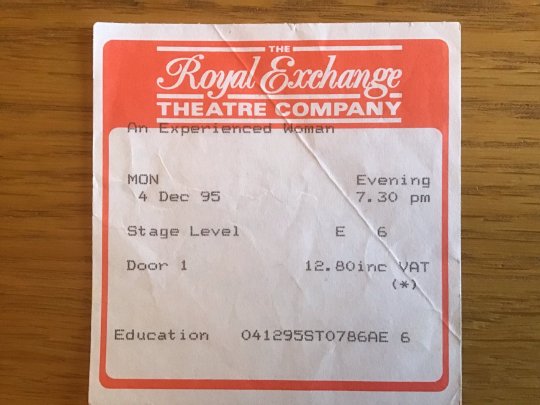
The action takes place on two Sunday mornings and opens with Bella, who's a 39 year old teacher, gardening in her back garden. We learn she's in a three-year long relationship with a live-in toyboy lover, Kenny (DT) who's a former pupil and 15 years younger than her. And that he didn't come home the previous night.
Bella calls Kenny her "charming, fallible boy", and she treats him like one. Former lovers say he's "tall, kind of blond, with a lovely lean build" and "incredibly rich brown eyes." There’s "just no resisting him,” and he's "bastardly good looking.”

David in rehearsals as Kenny (from program of An Experienced Woman Gives Advice)
In a series of interruptions from people passing into the garden, Bella (Redmond) dispenses advice to the inquiring strangers Nancy and Irving (Galbraith), and learns Kenny spent the night with another woman...from the woman herself, Nancy (McCrindle), who doesn't realize who she's told. What Bella does with this information - and how her meticulously cultivated freedom of choice lifestyle shatters, especially given her first love, Stick (Morton) lives nearby - is what the rest of the play explores. We see love, lust, and lies play out as Bella makes her choices.
And there's a scene with Bella and Kenny...and sex behind the doors of a rocking, exploding garden shed!
I haven't been able to locate a production script of the play to see whether this scene was enacted onstage, but Heggie's published script book says this scene, where Bella strips Kenny of his clothes piece by piece before they go into the shed to have sex offstage, had some brief nudity. None of the play reviews I've been able to find mention any nudity, though one article about the play does state that due to "strong language and the sexual nature of the story, the play is not suitable for children under 15." (I don't know how much weight I should give this particular article, however, because it also calls the lead character "Maggie" rather than "Bella"!) Anyway, if this scene was included in the play, it would be the second known instance (the first being that now-infamous What The Butler Saw full frontal nude photograph) where DT was onstage in the buff!
Speaking of reviews, they were wildly different - some found it hilariously funny with barbed, sharp dialogue, while others found it fatiguing. David's "able portrayal" as Kenny was praised as part of an extremely talented cast, and his was called a "great performance".
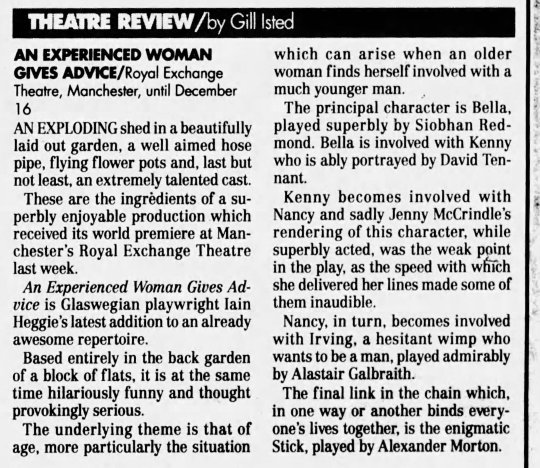

David and Siobhan Redmond earned Manchester Evening News Theatre Awards (MENTA) nominations - Redmond for Best Actress, and David for Best Actor in a Supporting Role. They also earned British Regional Theatre Awards nominations; Redmond for Best Actress and David for Best Actor. The play itself was also awarded a MENTA nomination for Best New Play. Redmond won both her nominations; David and the play didn't.
Photos from the play are almost nonexistent. I haven't located any images housed in any archives anywhere...so far. That doesn't mean they're not out there, mind you, just I haven't found them yet! I did manage to find a few of horrible quality while digging around in newspaper archives (I'll refrain from venting here about the quality aspects of digitizing newspapers, as that's a rant for another day) but it's a damned shame. I mean, in one of these, David just looks like a David-shaped black hole with floating arms! Nevertheless, I'll leave them here.
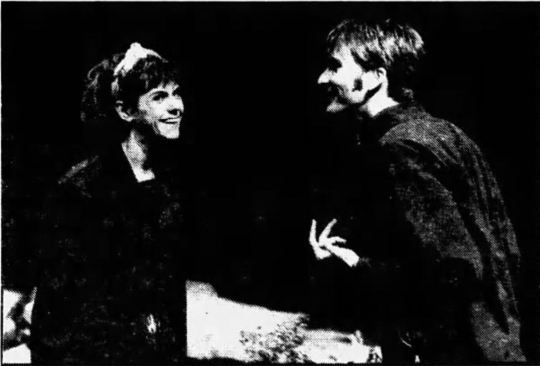
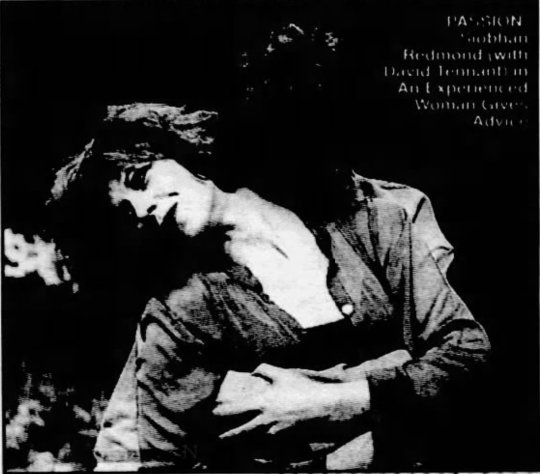
Something else I found fascinating during my research was that, like many venues, the Royal Exchange had a tradition of scheduling at least one informal discussion with the director and members of the company for each of their productions. While I didn't find any information on whether a discussion of this sort occurred during EW's run, I have to assume it did. Ah, to be a fly on the wall for that!
And that, my friends, is pretty much the story of An Experienced Woman Gives Advice! I wish I knew much more about this play, but like many parts of David's theatre career, wide gaps in our knowledge remain. But I keep on looking.
Thanks for reading!
#DavidTennant#ObscureDavidTennantPerformances#DavidTennantEarlyTheatre#AnExperiencedWomanGivesAdvice
21 notes
·
View notes
Text
David Tennant's Obscure Performances: His Involvement with Read Not Dead (pt 3) - What You Will
Okay - I promised to fill everyone in on the two unattributed plays David did for the Globe's Read Not Dead project, didn't I? So I'll begin the first never-before-talked-about-in-the-fandom play right now. If you want to catch up on the first two parts and understand a little bit of the history behind the Read Not Dead project before diving into this one, go here for the first part, and here for the second. Then come on back!
The second and third of the four Sunday afternoon staged readings David did while working with the Globe's Read Not Dead (heretofore called RND) project were written by the same author: John Marston. But before we get into the plays themselves, let's take some time to learn a little about John Marston.
Marston was an English playwright whose best known work is 1604's The Malcontent. He began writing in 1598. Much of his work was written for the boy’s theatre company Children of Paul’s and for the Blackfriars. If you went back to one of my previous posts about the Read Not Dead project and David's involvement in their staged reading of 1606's The Fleer by Edward Sharpham, you'll recall reading a bit about the Blackfriars (but if not, they were the Blackfriars Children, a theatre company wholly made up of boy actors.) Anyway, John Marston was a Blackfriars shareholder.
Marston's plays were very popular. He was a consummate satirist who made sure to include lust, violent imagery and impropriety in almost every play he wrote - his poetry was burned by church order! He even dared to satirize the King (though he had to apologize for that of course!) His satirical, critical work caused many a political scandal. Eventually in 1608 Marston was sent to Newgate Prison. After his release, he decided to abandon the theatre, move out of London, and take holy orders. He died in 1634, and to our knowledge never wrote another play. ( As an aside, I encourage you to learn more about Marston. As well as being a contemporary of Shakespeare, he's quite the fascinating character! Here's a good start.)


Okay. Let's go back to the "present" of 2002.
David was a busy boy! He began 2002 starring as Robert in Push Up, an ensemble play about ambition at work. Written by Roland Schimmelpfennig and directed by Ramin Gray, it opened 8 Febuary 2002 at the Jerwood Theatre at the Royal Court.
Push Up was a vignette-style play, and The Telegraph had this to say about it: "The meat of this 90-minute play consists of three edgy, aggressive dialogues between rivals in the firm." David played Robert, who "turns down a proposal from Patrizia for a new TV ad, identical, it turns out, to the one we have already heard described, except that the puddle is now located in New York's Central Park. The fact that these two once had great illicit sex together in Kramer's office, and were both too proud to contact the other afterwards, merely adds to their animosity."
(FYI, I've listened to an audio recording of this play, as it's archived at the British Library. It's stellar!)

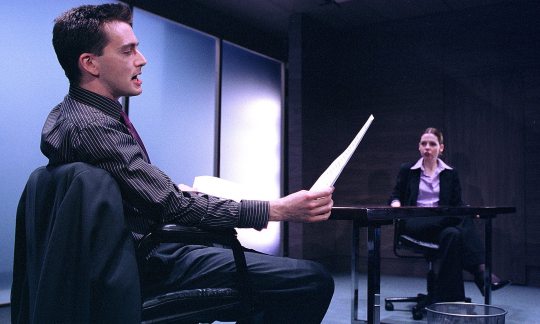

David Tennant as Robert in Push Up, 2002
If you've read my previous threads, you'll recall David's first reading with RND was 1999's Edward III and his last was 2004's The Fleer. But now we're in 2002. And David hadn't done another staged reading with RND since 1999. But that was about to change.
Reviews for Push Up were very favorable. The acting was called outstanding, David's was called "a fine performance", and one reviewer said the "undertow of lust between Tennant and [co-star Jaqueline] Defferary [was] particularly riveting." Push Up's run ended in March 2002.
(Oh...I asked director Ramin Gray if there had ever been a programme for Push Up. He told me a printed edition of the play text with the cast list was available, but as far as he was aware, an official Royal Court programme wasn't made for the run. Published by Nick Hern Books, you can find it on Amazon!)
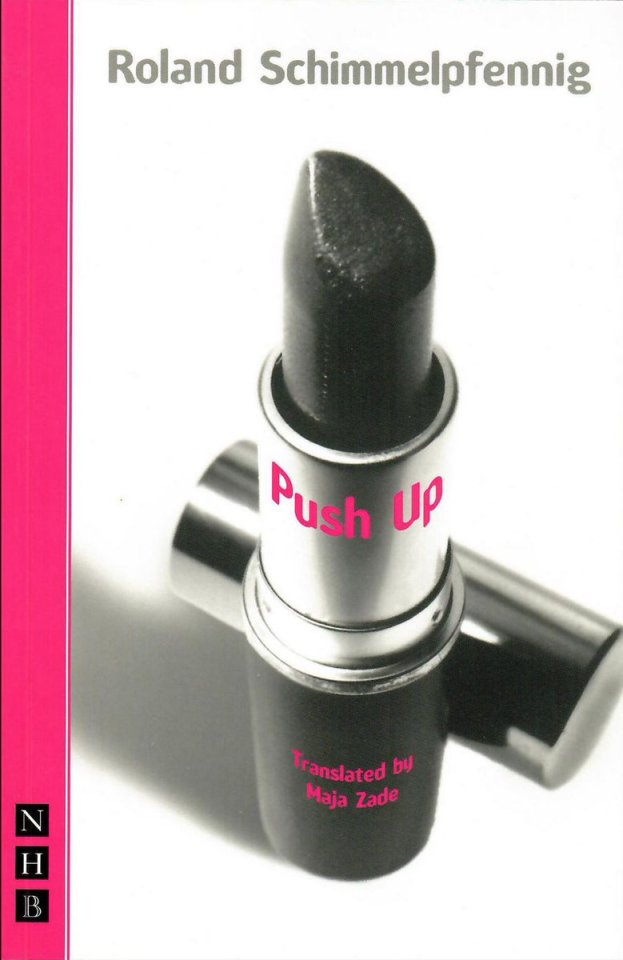
A month later (April 2002) David was treading the boards again as young security guard Jeff in Lobby Hero by Kenneth Lonergan. Set in the lobby of a middle-income Manhattan high rise, the play presented moral dilemmas about things like culpability, justice, and the dangers of truth. Lobby Hero opened at the Donmar from 10 April 2002 to 4 May 2002, then reopened at the New Ambassadors Theatre from 1 July 2002 to 10 August 2002. During its run, the play (& DT!) got rave reviews. It earned David a Olivier nomination for Best Actor, and the play for Best New Comedy.
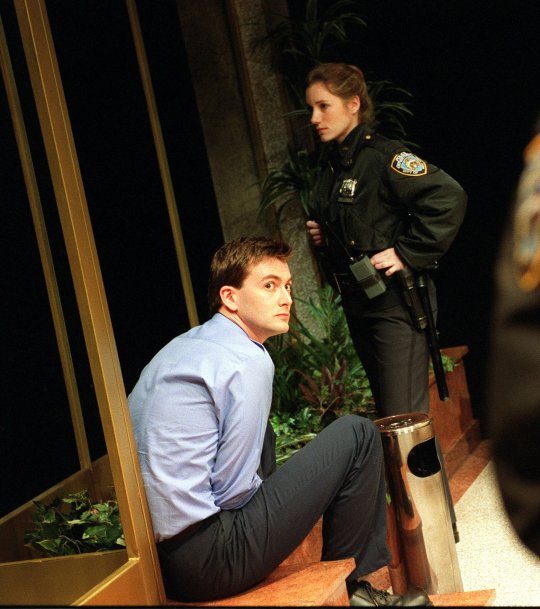
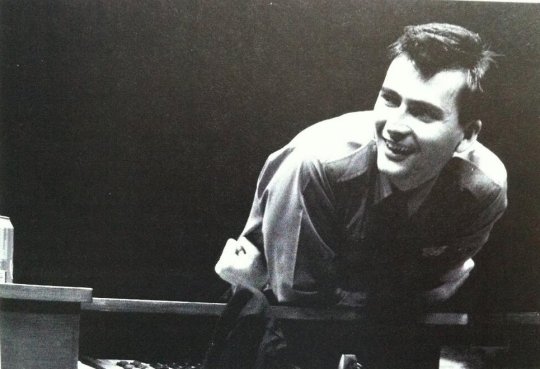

David Tennant as Jeff in Lobby Hero, 2002
David was probably riding a bit high. Push Up had done well and he'd immediately gone to do Lobby Hero, which was generating awards buzz. But did you notice something about the Lobby Hero dates? David had a month off between runs. And he didn't just sit around twiddling his thumbs -- nope nope nope -- because we all know twiddling has never been David's style.
So on 26 May 2002, David showed up once again to participate in RND. This time it was for a comedy called What You Will, which the aforementioned playwright John Marston likely wrote around 1601 but which was not published until around 1607. What You Will was written while Marston was duking it out (in literary-fashion) with a contemporary writer called Ben Jonson. To say the two men didn't like each other was an understatement. They traded satirical jabs and placed caricatures of each other in their plays. And oh....if the play's title feels vaguely familiar to you, you're not wrong there either! Marston pinched the name of the play from a little old thing you might've heard of called Twelfth Night, written by some fellow called Shakespeare.
What You Will was full of song, music and dance, as it had been written for a children's theatre company. It had a large number of younger parts - pages and the like, and women - for the boys to fill (as I'm sure you'll recall, at this time women's roles were played by men and boys.) In addition to the music, it was also a satire as well as a romantic comedy. Set in Venice, it tells the story of Celia, who believes her husband drowned in a shipwreck. She plans to marry, but another of her suitors, Jacomo, schemes with her family to prevent this. David played the role of Jacomo.
And here's the cast list - again, all thanks and credit for the digitized list goes to the Globe Archives!

Here's a more in-depth look at the plot, and here's a link to the full text of the play, if you're interested.
This performance was recorded, though I haven't listened to it (and sadly, the archive notes the last part of the audio is cut off.) You can listen to the recording of the performance and others from the series, as the recordings are archived in the Globe Archive and Library in London. Access to the archive is available by appointment only for professionals and academics affiliated with institutions of higher education.
So on that Sunday in 2002, David joined in to perform the satirical musical romantic comedy What You Will, directed by James Wallace. And speaking of musical parts - there was singing and dancing to do, scripts in hand. And Jacomo had at least one song to sing!
I'm sure many of you have wondered whether David's done any honest to goodness musicals during his career. Well, I'm here to tell you that while he's burst into song relatively recently and briefly with Don Juan In Soho and Good, and quite possibly with What You Will as well (I haven't listened to the recording of the play to see if David actually sang) - I can provide a partial answer to that question. In a previous interview he mentioned an early play he did in drama school called The Hired Man and said he was a member of the chorus. Yes, that's true, he was, and yes, he did sing in that 1989 production (listen here to hear him sing part of what he sang then.) So he's certainly flirted with the genre. But as I've done much research into those early days of his, there miiiiiight be a few other productions in which he sang. *ahem* I'm just sayin'.
All that comes later. For now, here ends the tale of What You Will. But don't despair - I mentioned earlier we've got one more staged RND reading of David's to explore, and I hope you'll tune in to hear about it, too!
#DavidTennant#ObscureDavidTennantPerformances#ReadNotDead#DavidTennantEarlyTheatre#WhatYouWill#LobbyHero#PushUp
24 notes
·
View notes
Text
David Tennant audios: Tuesdays & Sundays is an audio gem
As you all know by now, surely, I'm a David Tennant theatre buff, but right now I want to explore my other major passion with regards to his work: his audios. He's done a bewildering amount of audio work and a lot of it is really, really good. With that in mind, I'm going to concentrate on one of my absolute favorite David Tennant audio works: a 2003 audio entitled Tuesdays & Sundays.
Based on a true story of an 1887 series of events between a young woman named Mary Tuplin and her lover William Millman in Margate on Canada’s Prince Edward Island, Tuesdays & Sundays begins with the young couple's spirits as they "awaken into a void. As they question where they are, they recall and begin to relive the story which got them there: their giddy courtship and the overwhelming passions of first love, the pangs of a six-month absence, an unplanned pregnancy, and a guilty and shameful young man amidst a community in which respectability is of utmost importance. As they try to cope, to keep love amongst the fear and confusions of youth, these two spirits ultimately stumble upon their own tragic ending."
Sounds intriguing, yes?
Tuesdays & Sundays was originally a 45-minute play written by Canadians Daniel Arnold and Medina Hahn. It was first performed in June 2000 in Edmonton, Canada, with the authors as the two principal characters William and Mary. Arnold and Hahn took the play on tours throughout Canada, Europe and the US and won many awards, including the Sterling Haynes Award for Outstanding Fringe Performance.
In 2003, Arnold and Hahn were asked to adapt the play for radio; one for Canada's CBC Radio (which starred themselves) and once for the BBC. I spoke to Arnold about how the play got adapted, and he told me, “CBC Radio was the first to approach us about a radio version, and we performed it on CBC Radio with minimal adaptation. The Edinburgh Festival is where Sara Benaim of the BBC saw it, and asked about a radio adaptation for BBC Radio 4. We adapted the play accordingly, and…re-set it to [Tusket in] Nova Scotia, where there was much more Scottish settlement. Margate on Prince Edward Island was much more English. We made…the characters both immigrants from Scotland, which actually worked quite well.”
The BBC adaptation was broadcast on 16 June 2003 as the BBC Radio 4 Afternoon play and starred David as William and Claire Yuille (who later appeared in the first episode of 2010’s Single Father, credited only as a “Doting Mum") as Mary. And on top of all that, David and Claire also voiced all of the play's other minor characters!
Of David’s turn as the young William Millman, Arnold told me, “We were quite taken with his performance in it.” He added, “We were thrilled when we learned David Tennant would play (my role) William…and when we heard the recording on the BBC, it sounded fantastic.”
And it DOES! In my opinion, there are so many reasons why this play is stupendous. David and Claire are top-drawer. The dialogue is back and forth, breathless and imbued with teenaged giddiness, bullet-paced and conversational - both with each other and in asides to themselves - and it must've taken some doing for the two actors to get this pace down just right without running over the top of each other and blurring it into chaos. But instead, it creates a perfect tension-filled atmosphere that draws an audience in and makes this play a must-hear.
By this time I imagine you're wondering where you can hear or read this play. Well, here's a partial script. Here's the original Canadian radio broadcast at the Internet Archive (which is a great listen in and of itself) but, sadly, hearing David's version had become a bit more difficult. The Internet Archive had a copy once but it's been removed, and Arnold and Hahn's DualMinds website has almost 5 minutes of the play, but as it's based in Flash Player good luck getting it to work. But I won't tell if you won't tell - so go get it here while it's still available. ;)
Here's a cute little David in advertising for the play - and below, some other historical information about the events the play is based on. If you don't want to know anything about the play before listening to it (spoilers!) then don't look beyond this photo!
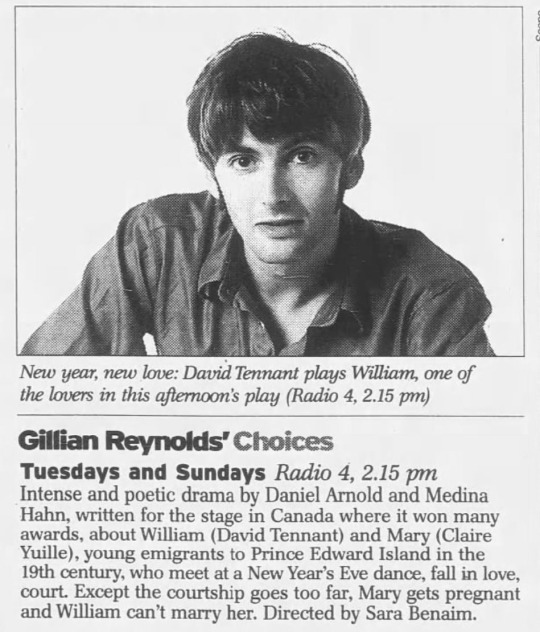
-----
The real Mary Pickering Tuplin was 17 years old when she was murdered, and her lover William Millman was convicted of the crime. Tuplin’s body was pulled from the Southwest River on July 4, 1887, just a short distance from where she lived with her parents in Margate. She had been shot twice in the head. Her body was weighed down with a heavy stone, and it was discovered she had been six months pregnant. Authorities separated her head from her body for forensic examination, and - bizarrely - it was never reunited with her body. It remained in the coroner's office, which eventually became a pharmacy. And there it remained until 2016, when it was finally reburied with the rest of her remains.
If true crime is your thing, you can access the entire report of the Tuplin-Millman murder trial, right here!
William Millman was convicted of Mary Tuplin's murder and was sentenced to hang. Despite the jury’s recommendation for mercy, he was hanged on 10 April 1888.
Many believe him innocent of the crime. Was he? It's highly unlikely we will never know.
25 notes
·
View notes
Text
David Tennant's Early Work: the short film 'Bite'
My normal David Tennant thread heads in a new direction: to one of his rare first performances on film as opposed to TV and theatre: the short film Bite. I've got personal history with this short, so it's dear to my heart.
Bite is one of DT's long-lost gems. Most of his fans know it exists, but few have seen it. It was produced by Su Bainbridge and written by Andrea Gibb, who DT fans may recognize as the author of the brilliant DT audio Sunburst Finish. Paddy Cunneen, who also wrote the music for The Pillowman, was its musical composer. Directed by Brian Ross and with a running time of 6:58, Bite was produced on 16mm film and screened at the Edinburgh Film Festival in 1997. It was broadcast in Nov 1997 as part of an STV arts program called Don’t Look Down.
But what is Bite about?
"Bite is a film about Alistair Galbraith, a passive postman who tires of being a spectator in his own life and decides to take control. When Alistair’s wife, Alison, commits adultery on their wedding day and shortly afterwards he is savaged by a ferocious dog, Alistair hits rock bottom, unable to cope with even the most undemanding of life’s tasks. From the depths of despair, he is galvanized into action and in true anti-hero style sets out to take revenge on those who have wronged him. Through taking this action, he is re-born."
David played Alastair Galbraith and his wife, Alison, was played by Sharon Small, who recently reunited with David onstage in the play, Good.
At this juncture everyone usually asks, "Can I see it?" Yep! You can reserve a viewing time if you're close to the Moving Image Archive in Glasgow, as a copy is held for private and research viewing only. And I'm pretty sure it's available, either directly or indirectly, because of me!
But before I get into that (it's the personal aspect I talked about earlier) here’s a bit of Bite you can see. The film's editor, Gary Scott, has a :44 extract of the film online right here!
ALSO - SPOILER ALERT - If you're interested in a blow-by-blow spoilery summation of 'Bite' because you can't visit Glasgow to see the short, here's a detailed plot summation.
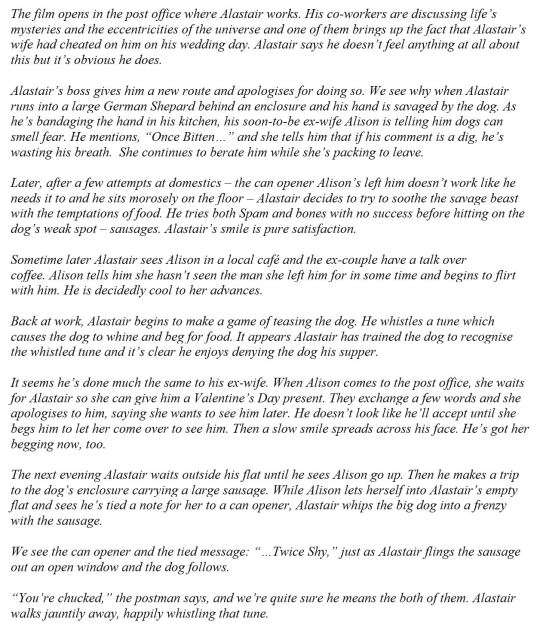
And now: how I wheedled it so Bite became available to view.
When I discovered back in 2014 that a copy of Bite was archived at the Scottish Screen Archive (now the Moving Image Archive) but not available - while his earlier short film SPACES was? - it made me wonder why, so I made inquiries at the archive to see why. It turned out SPACES had a viewable copy, but the copy of Bite in the archive was still on 16mm.
Now, this would've stopped any ordinary human being.
I am not an ordinary human being.
I was not a professional archivist then but I am now. The decision to become one this late in my life is partially due to my love of knowledge, organization and research, but also to my experiences since becoming - basically - an archivist and researcher with regards to DT's body of work. These things combined makes me rather dogged when there’s something I wish to attain.
I learned Bite was on 16mm and they couldn't make a viewing copy. Why? Because it was in copyright. And even funnier? They didn't know who held the rights! But I thought it should be available, so - even though I'm in the US and everyone else was in the UK - I decided to try and make that happen.
Archive personnel suggested I ask Creative Scotland about the rights, who suggested I ask the film’s production company. I was told it was rumored they had a VHS/beta copy of the film. I contacted each and every one of them to find out if this was true.
After months of back-and-forth emailing with the production company and soldiering on even through staffing rotations and I had to retell my entire story of the hunt again and again, I was still in a state of limbo. Finally the production company said they for sure did not have a copy of it but they could begin to negotiate with the National Library of Scotland for one. A few months later they learned they'd be able to procure a copy, but it would cost them X amount for a post-production company to digitize the 16mm, etc., etc.
Progress, right? Frankly, it felt like a scene in a comedy, as each thread in this chain of people needed to make their own copy in this format by this company for this archive or that person or...you get the gist. And no one could tell me if it would actually get done. So I kept reaching out.
To make a ridiculously long story short, one full YEAR afterwards, the archive finally managed to obtain a copy that was viewable for others to view onsite!
That was a reward in and of itself. An obscure piece of David's body of work had been pulled from its original 16mm - where it might have languished forever - and preserved on a format available to us today.
But I got a few tangible rewards, too. One, an email from the production company's owner that made me laugh harder than I'd laughed for a while: "Feck my old tin boots! I’ve just looked at who we cast in that film!"
Yes, sir. You DID cast David Tennant! Indeed you did!
And two, my very own copy of Bite (which, of course, I had to sign my life away for!) I got permission to release some screen shots, but that was it. And while it felt like an acknowledgement, I'm really just pleased we rescued it.

I took my copy to a convention DT was attending, and when I laid it down, he immediately looked up at me. "How - and where - did you get THAT?"
I laughed. "Persistence?"
He laughed and shook his head. "I hadn't thought of that one in a while. I remember that dog."
"You were a great postman."
And he was.
Lastly, I thought I should post some new screenshots. Sorry they're not great quality, but neither is my copy.

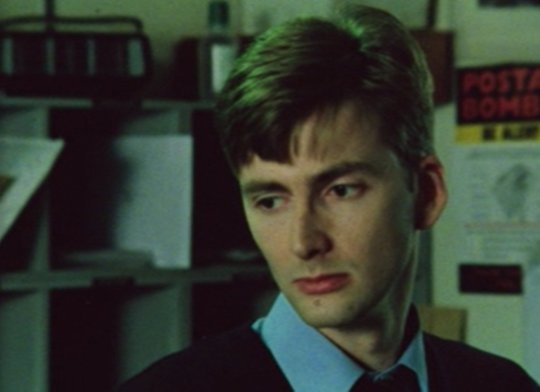
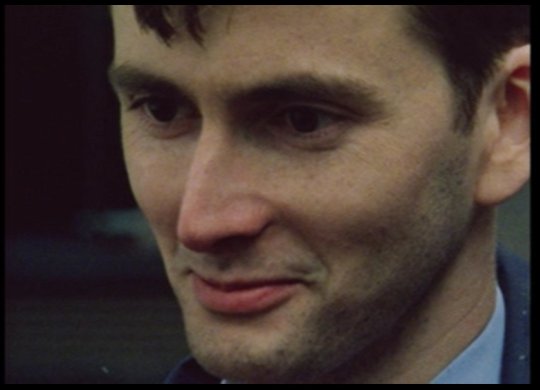
38 notes
·
View notes